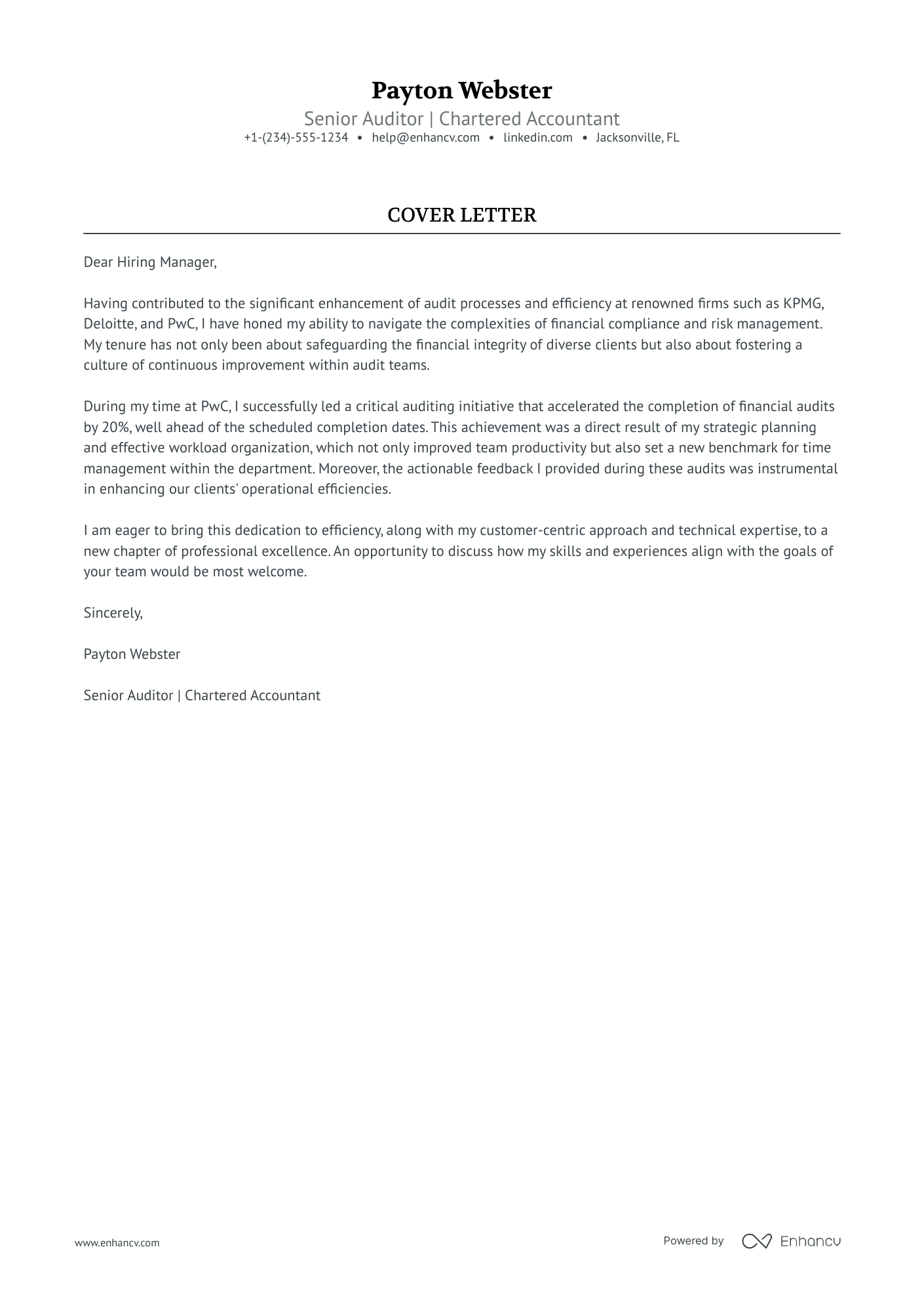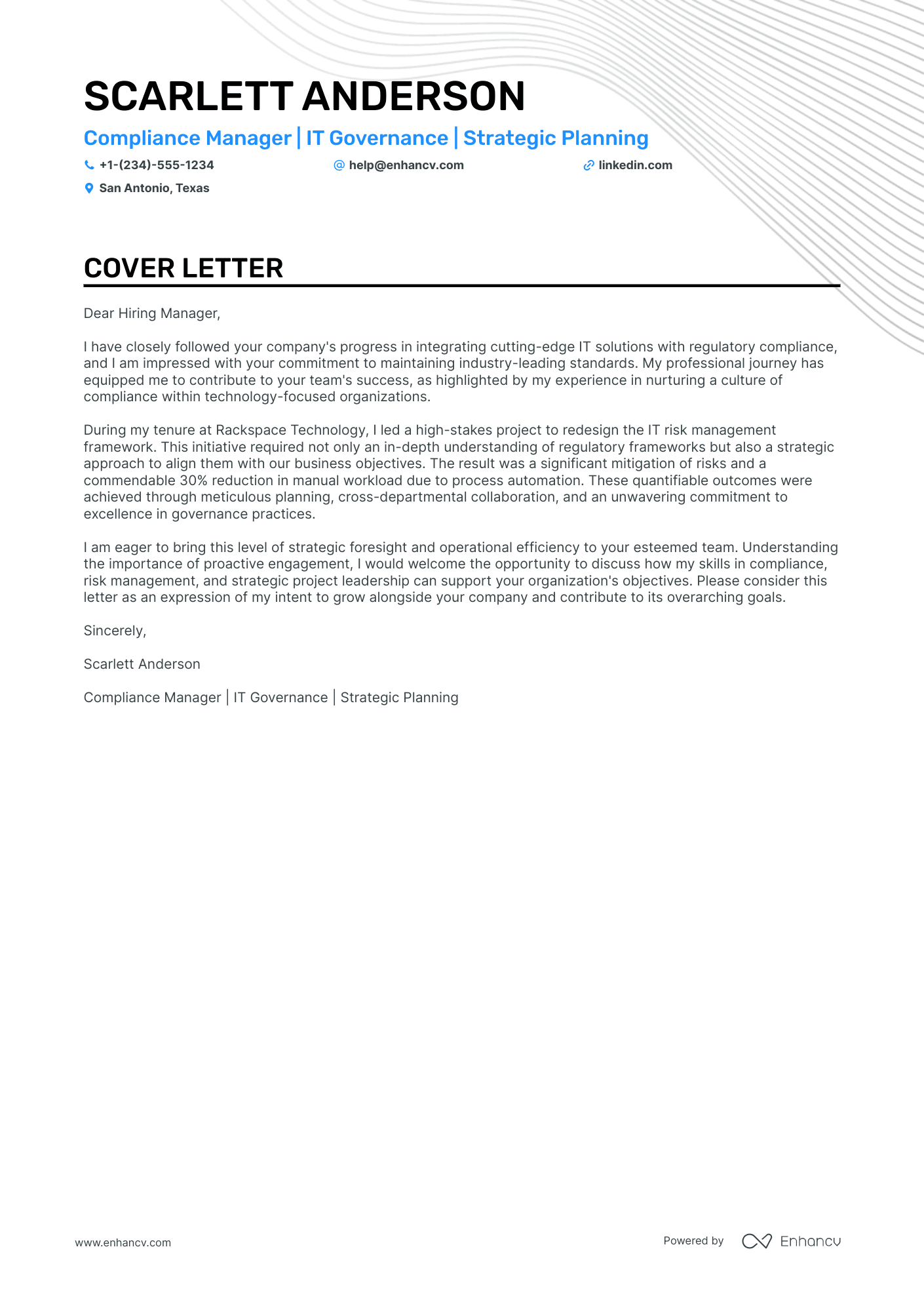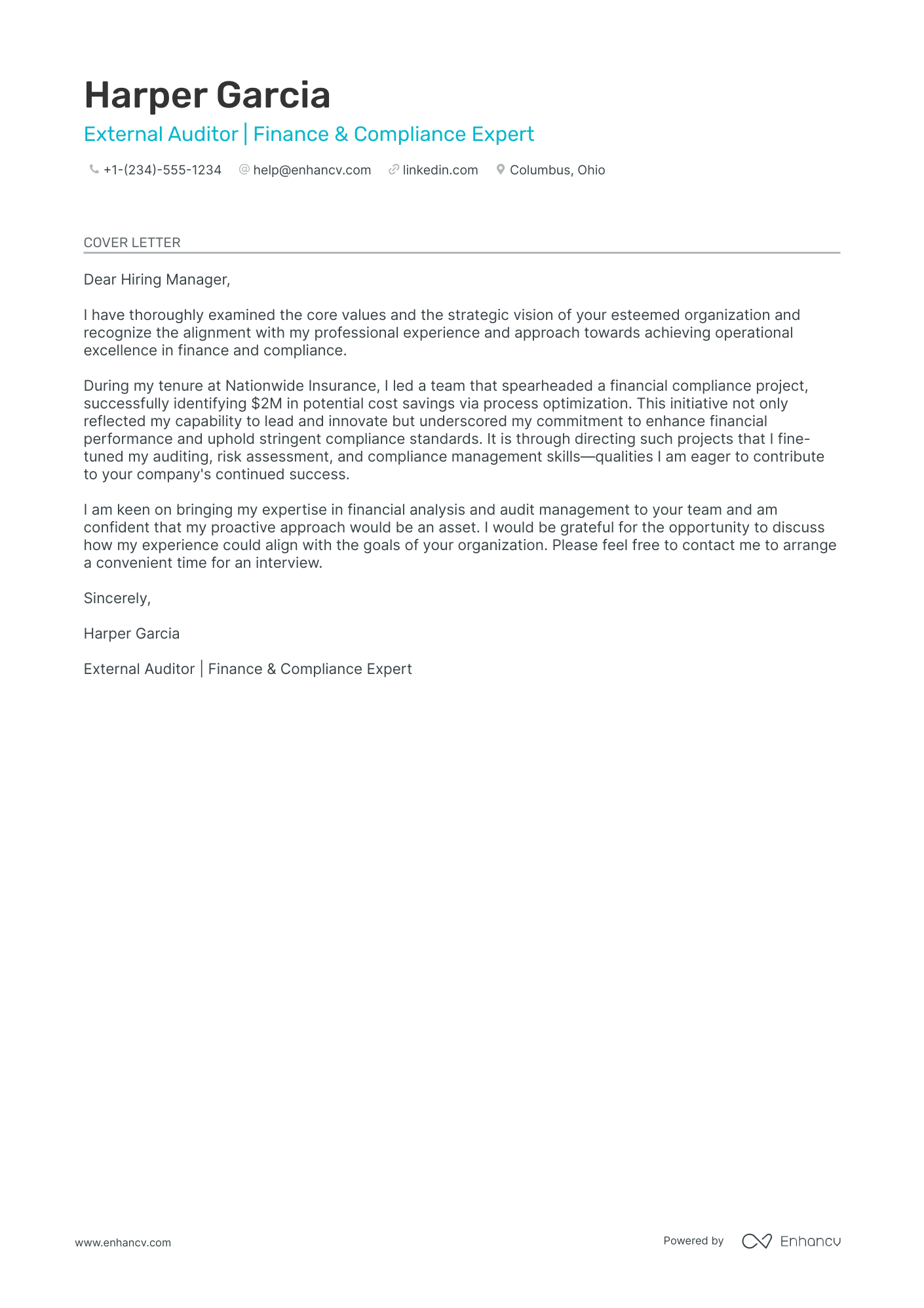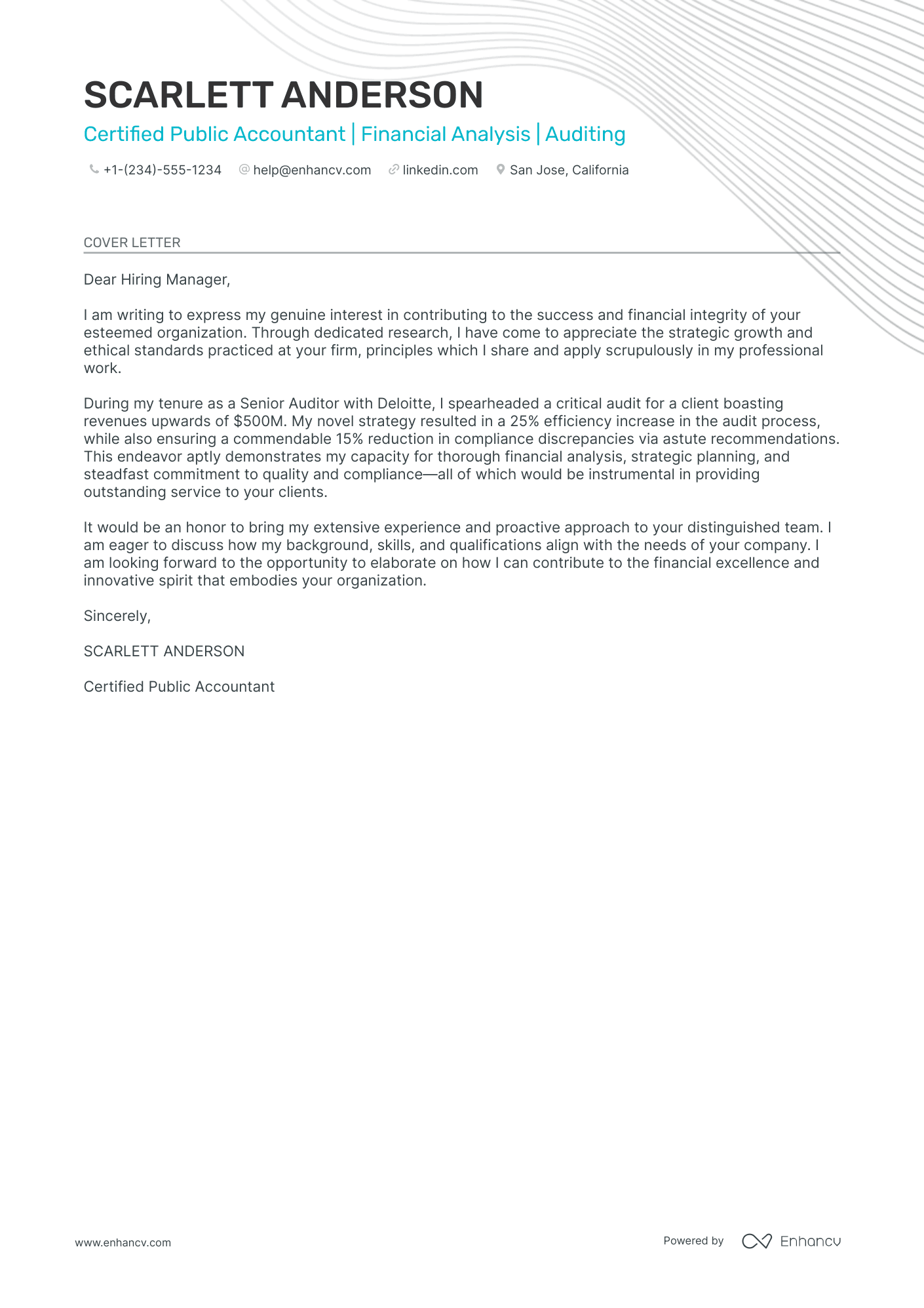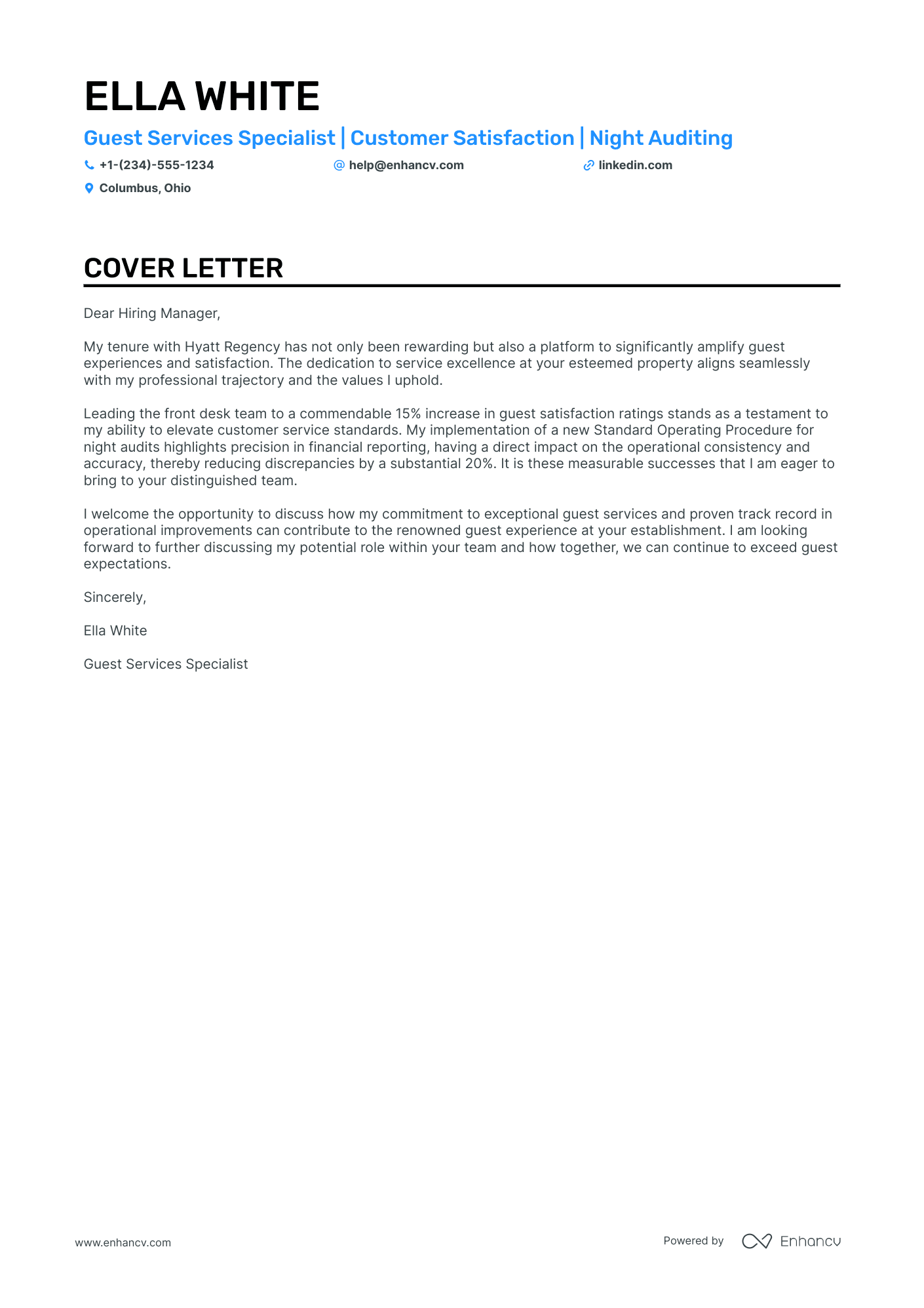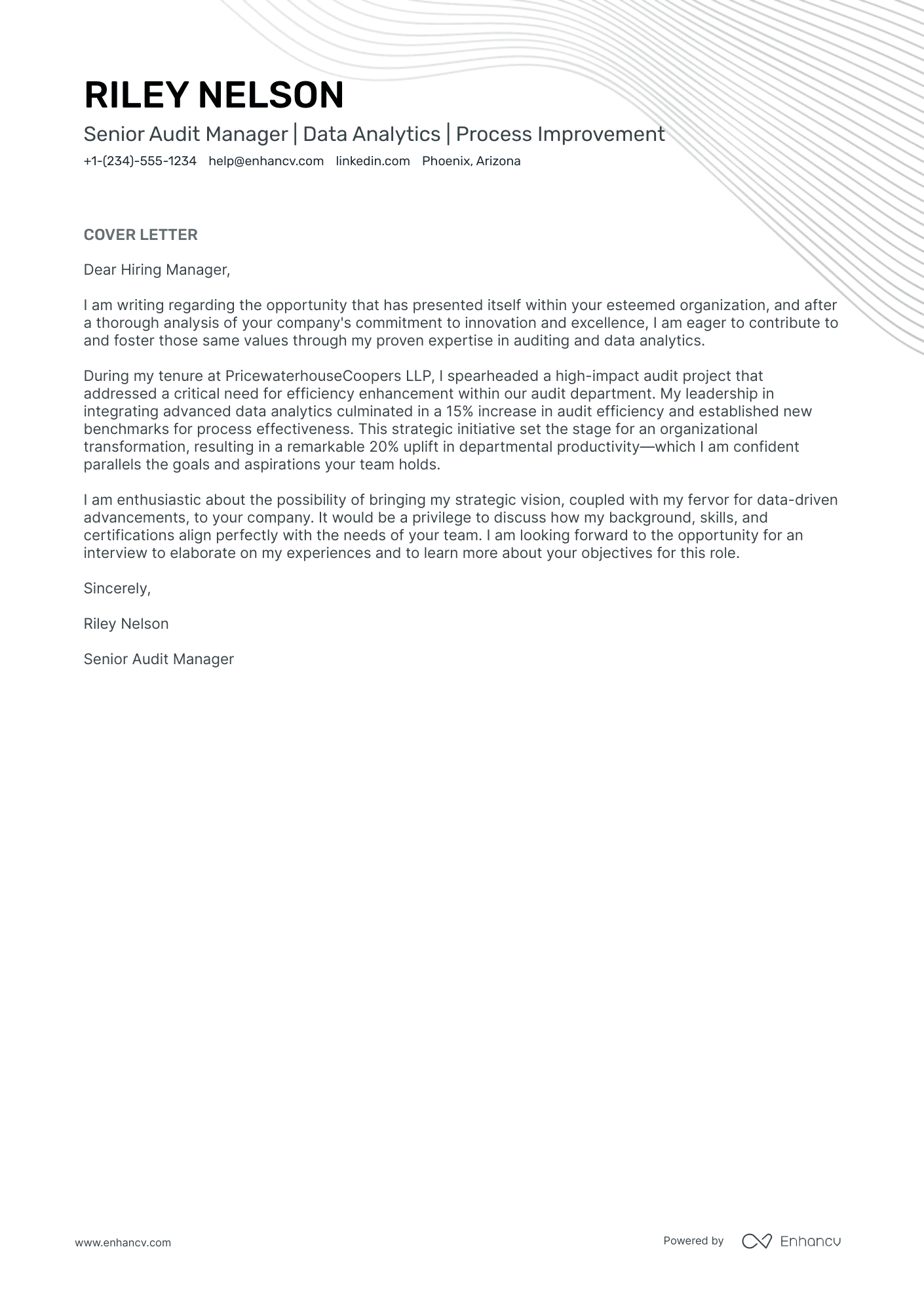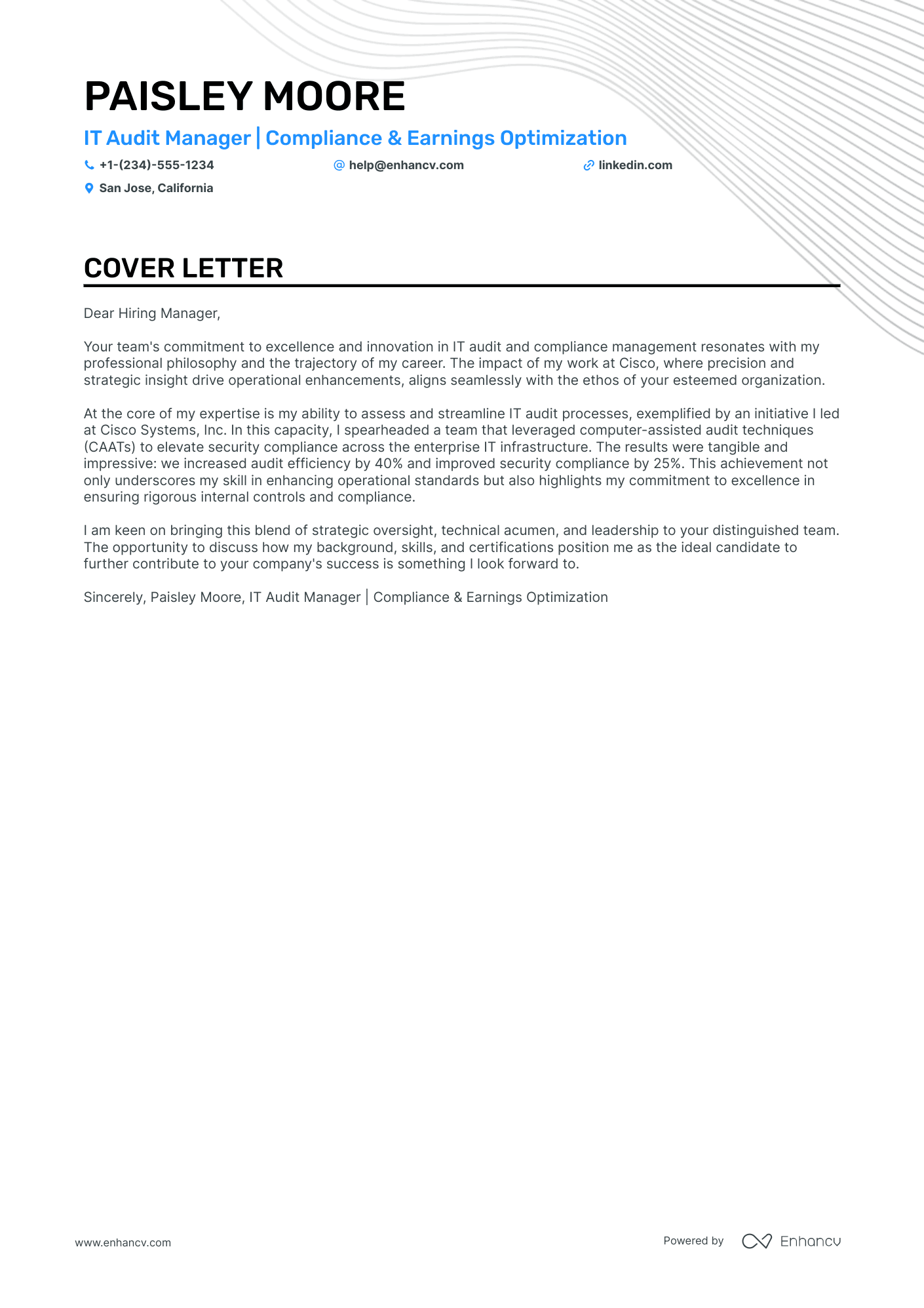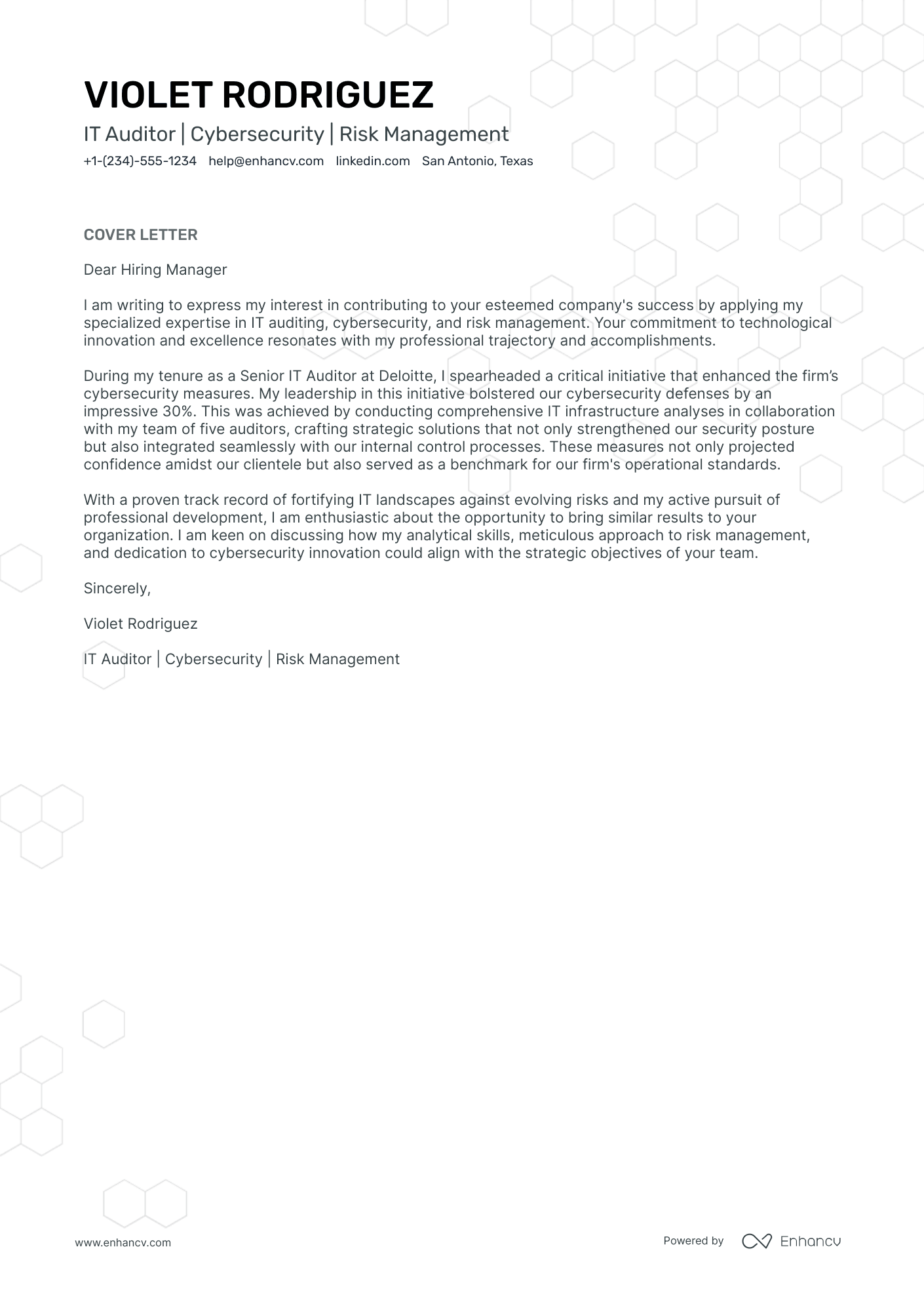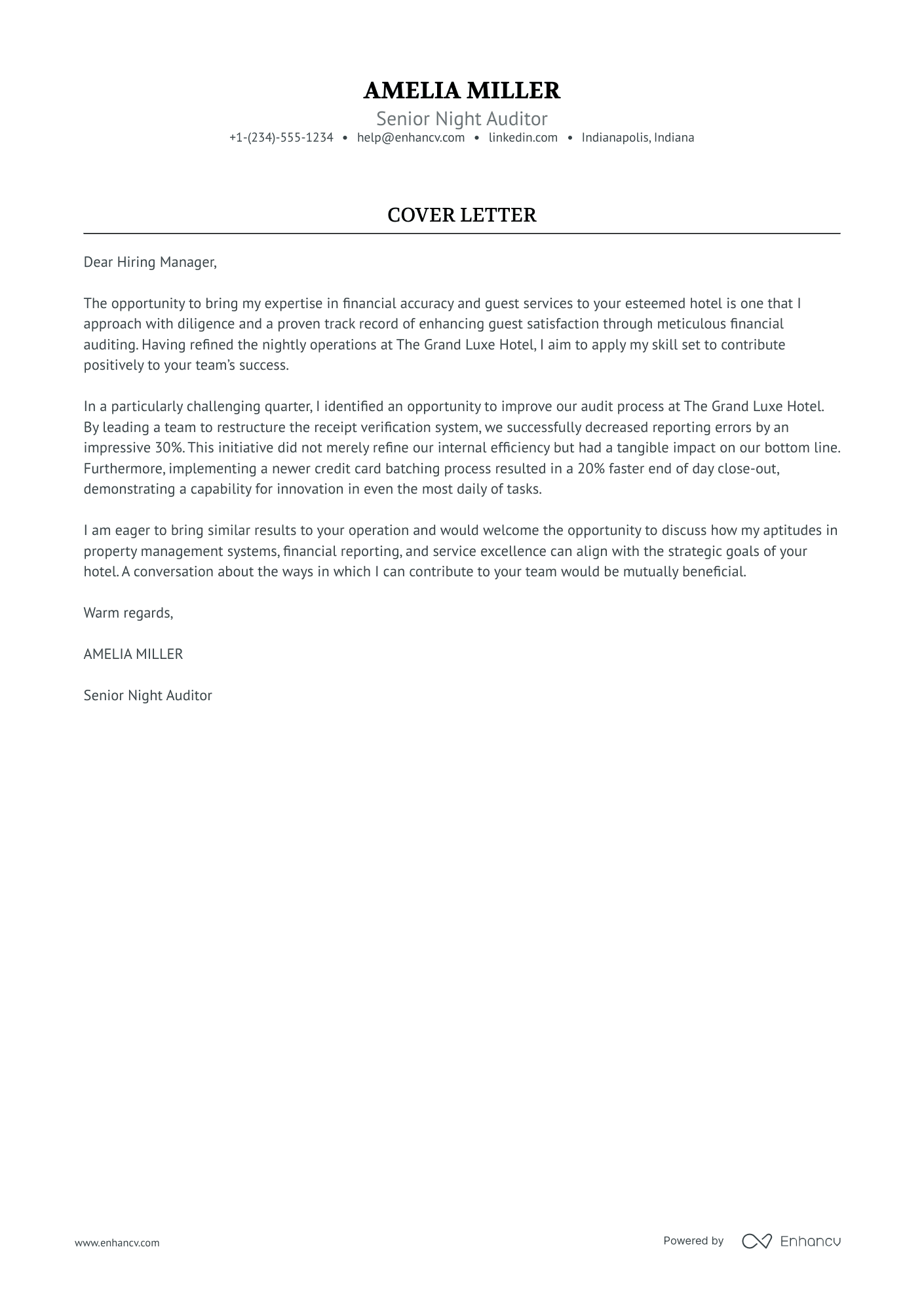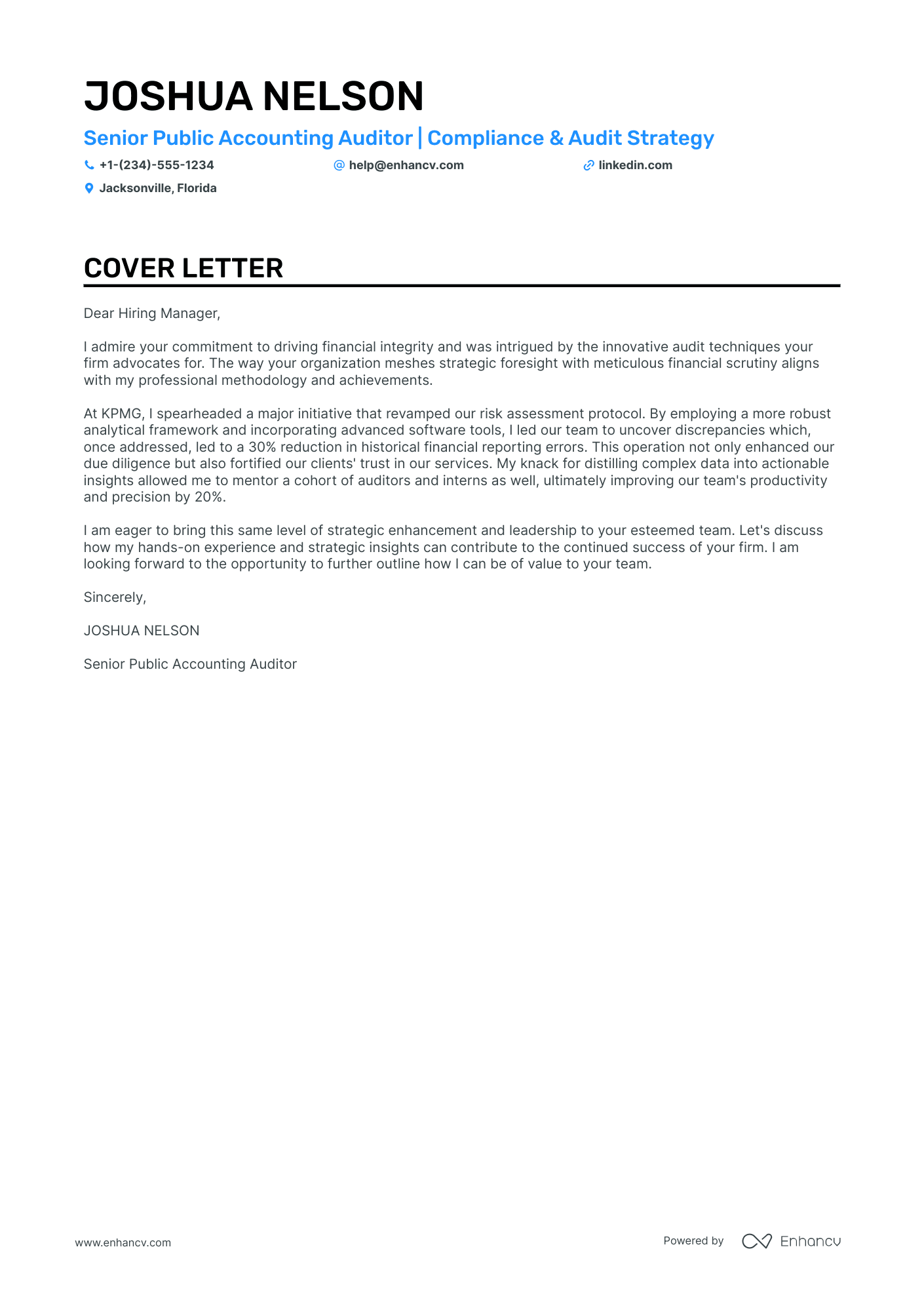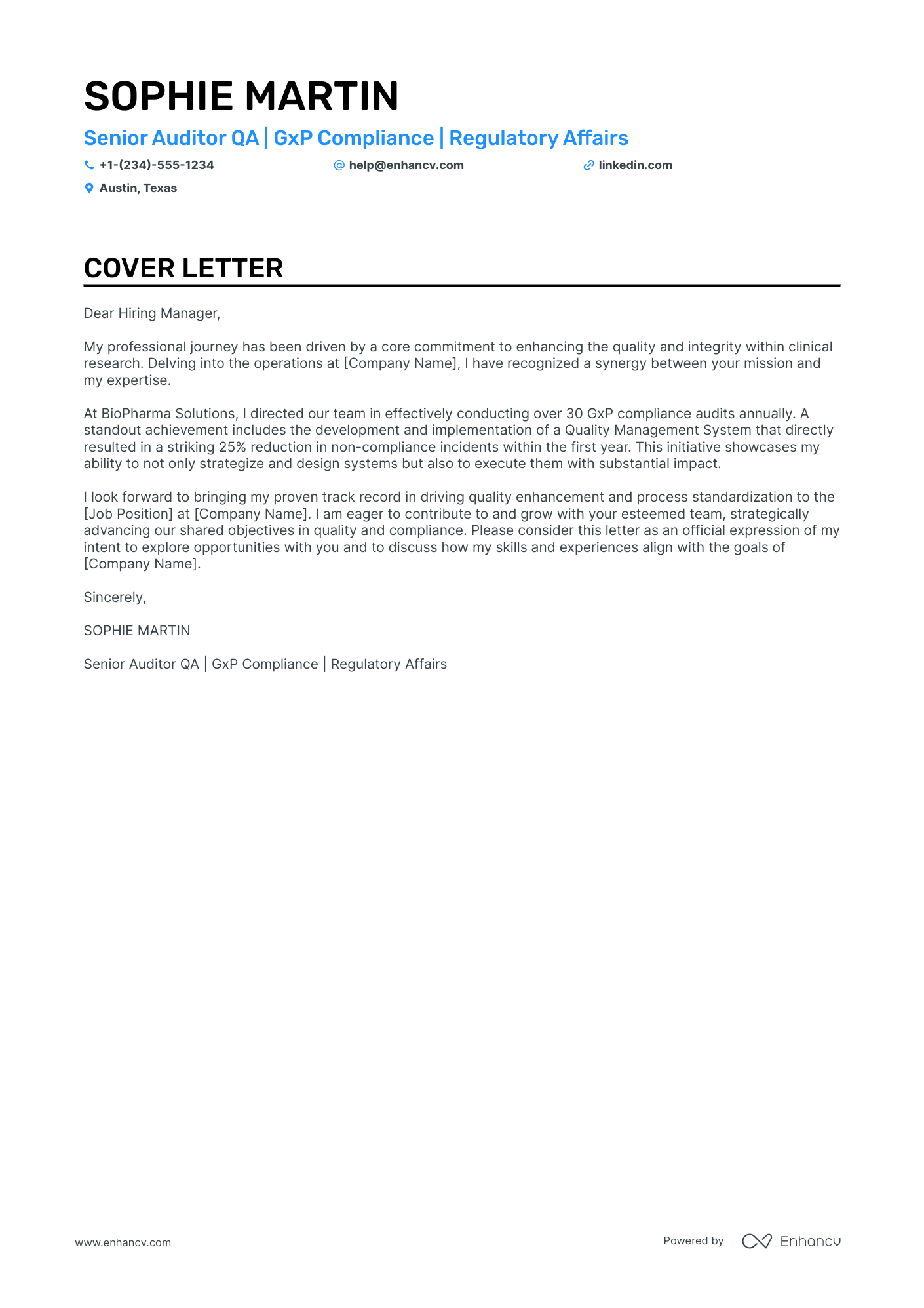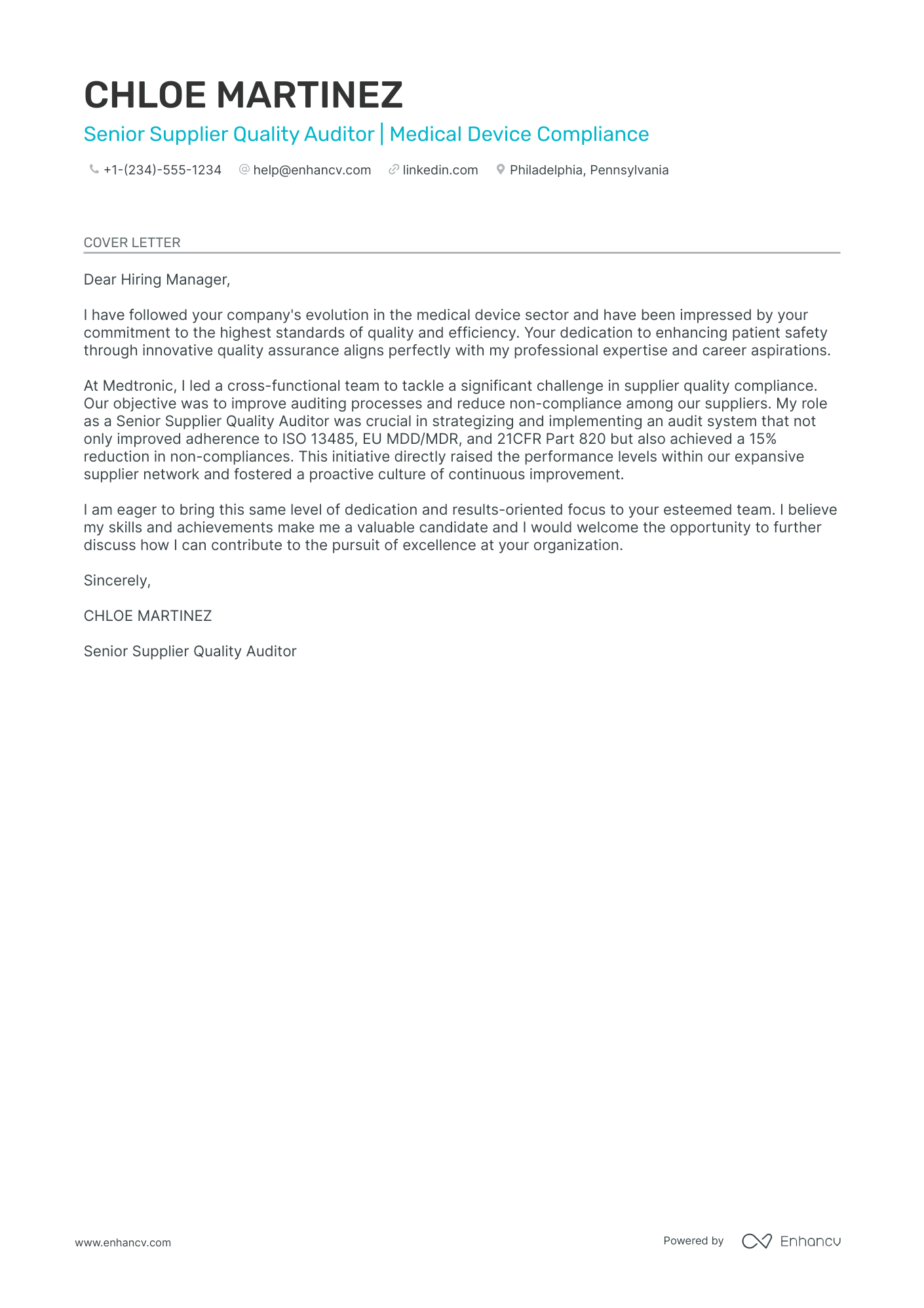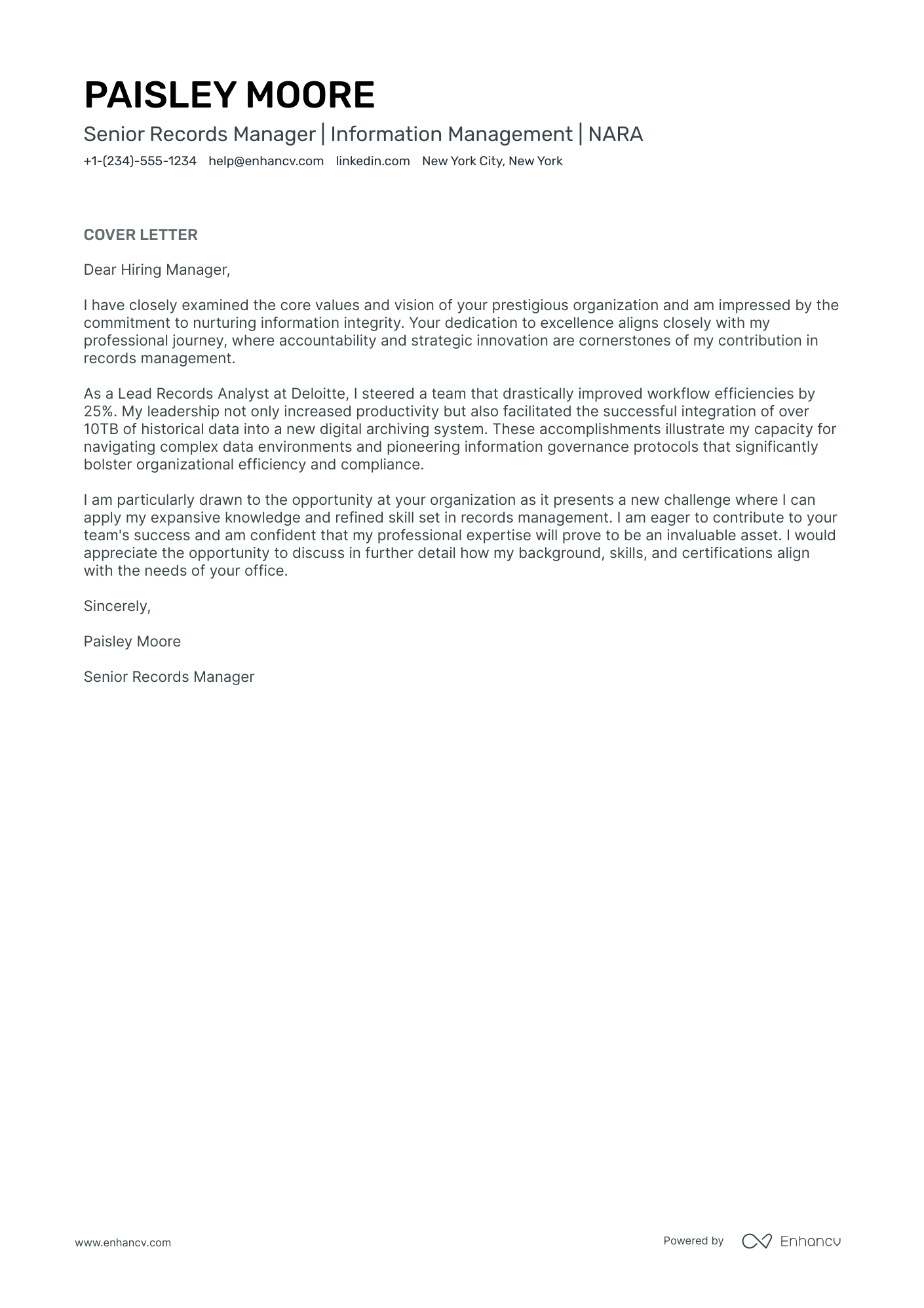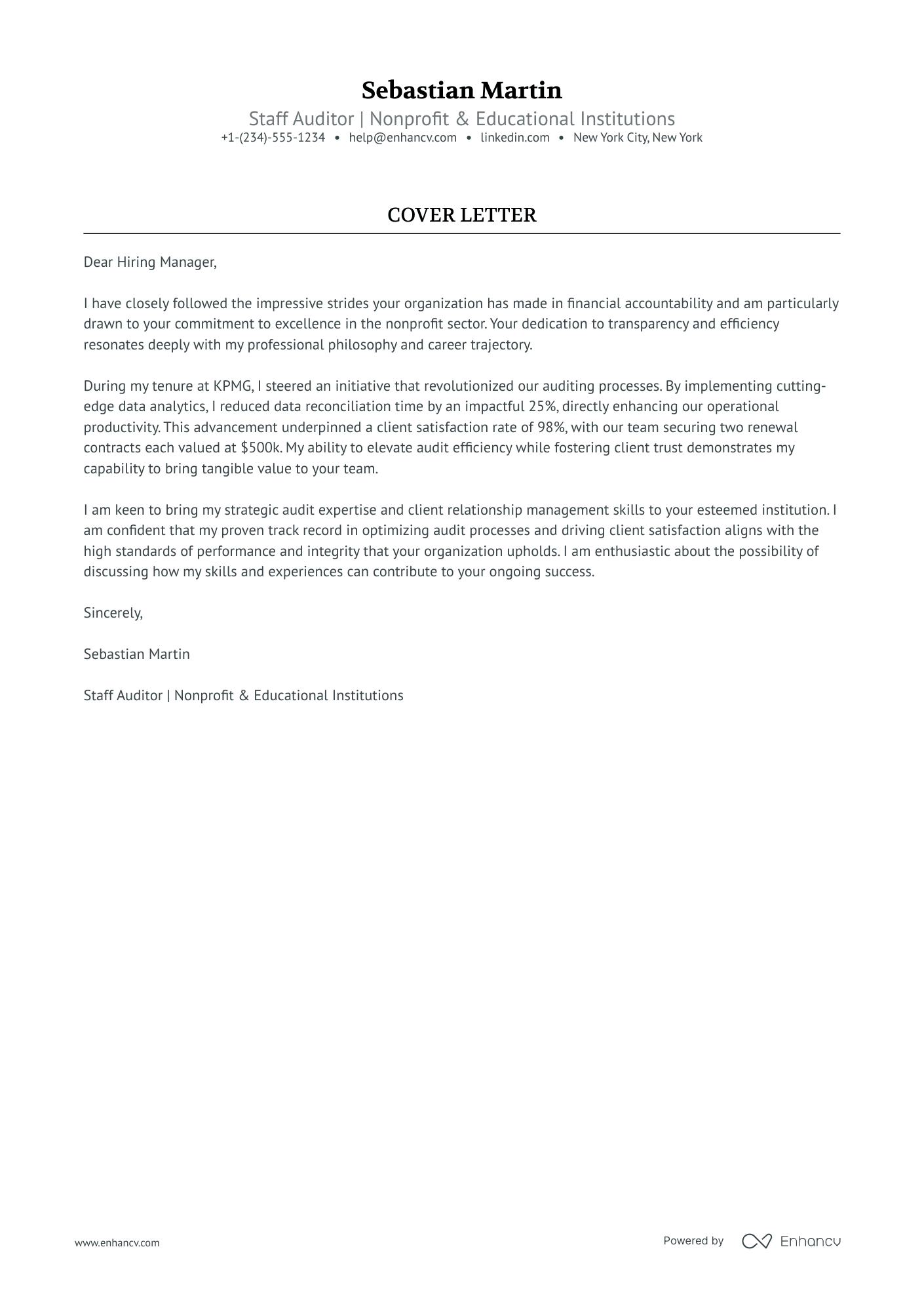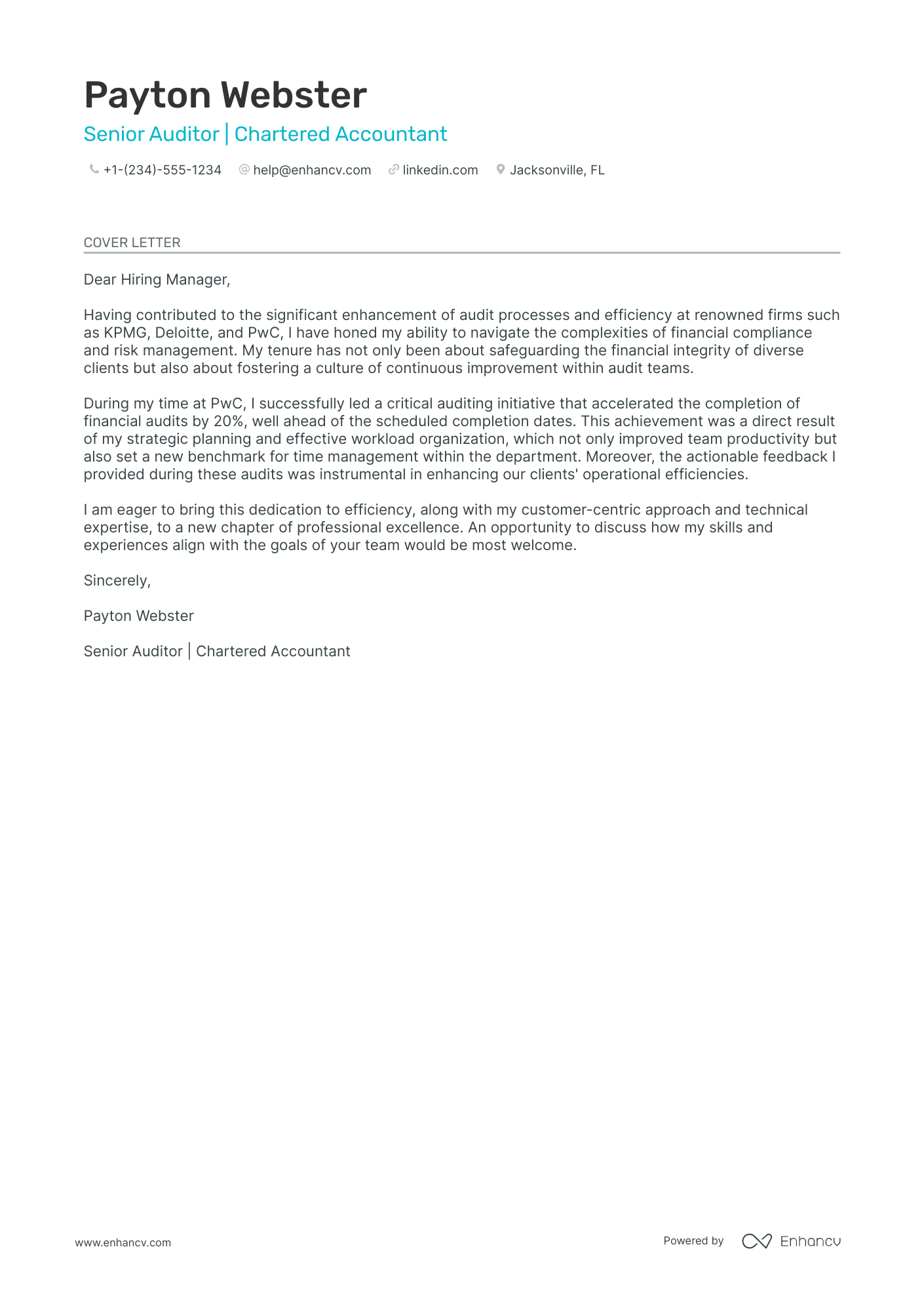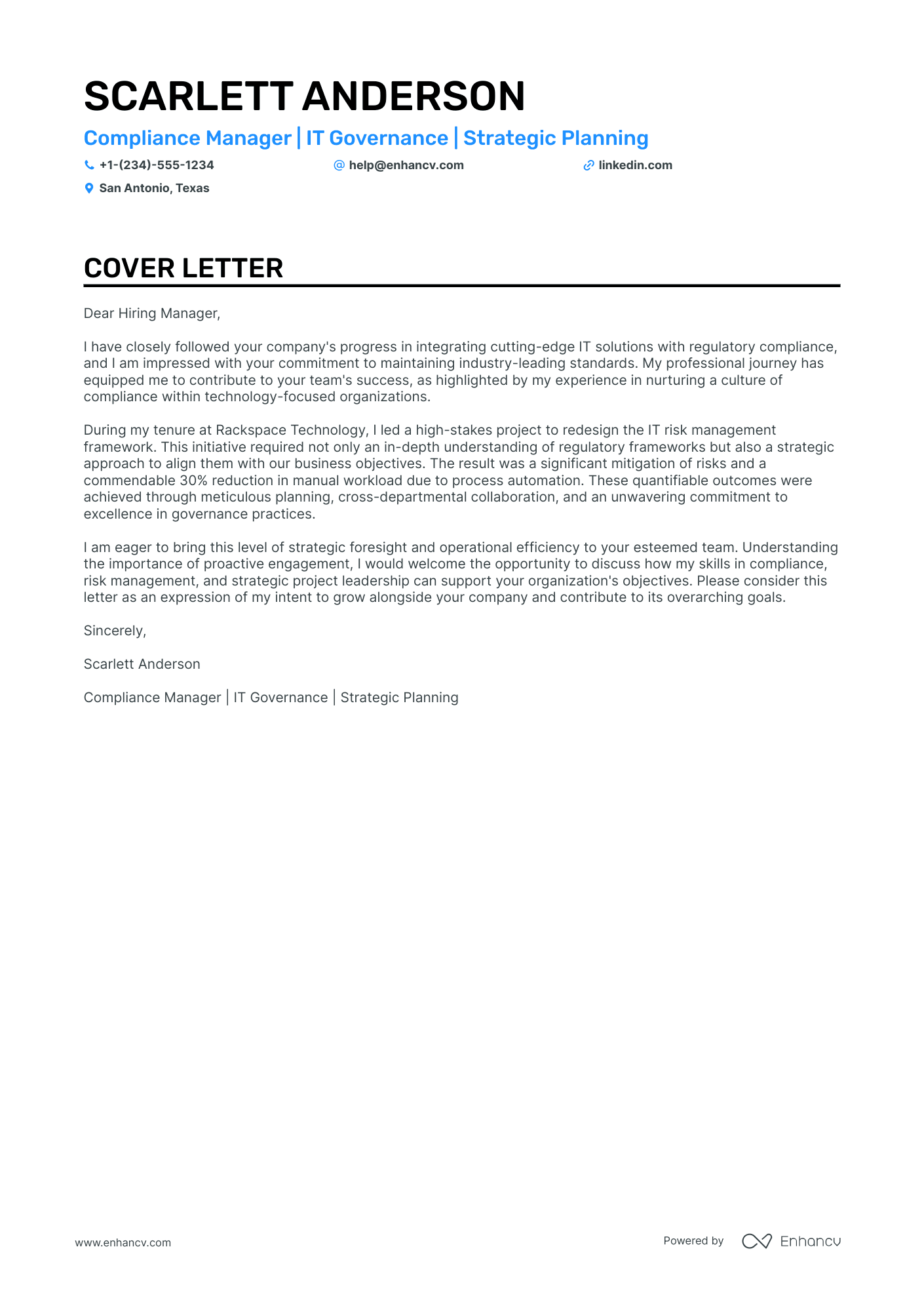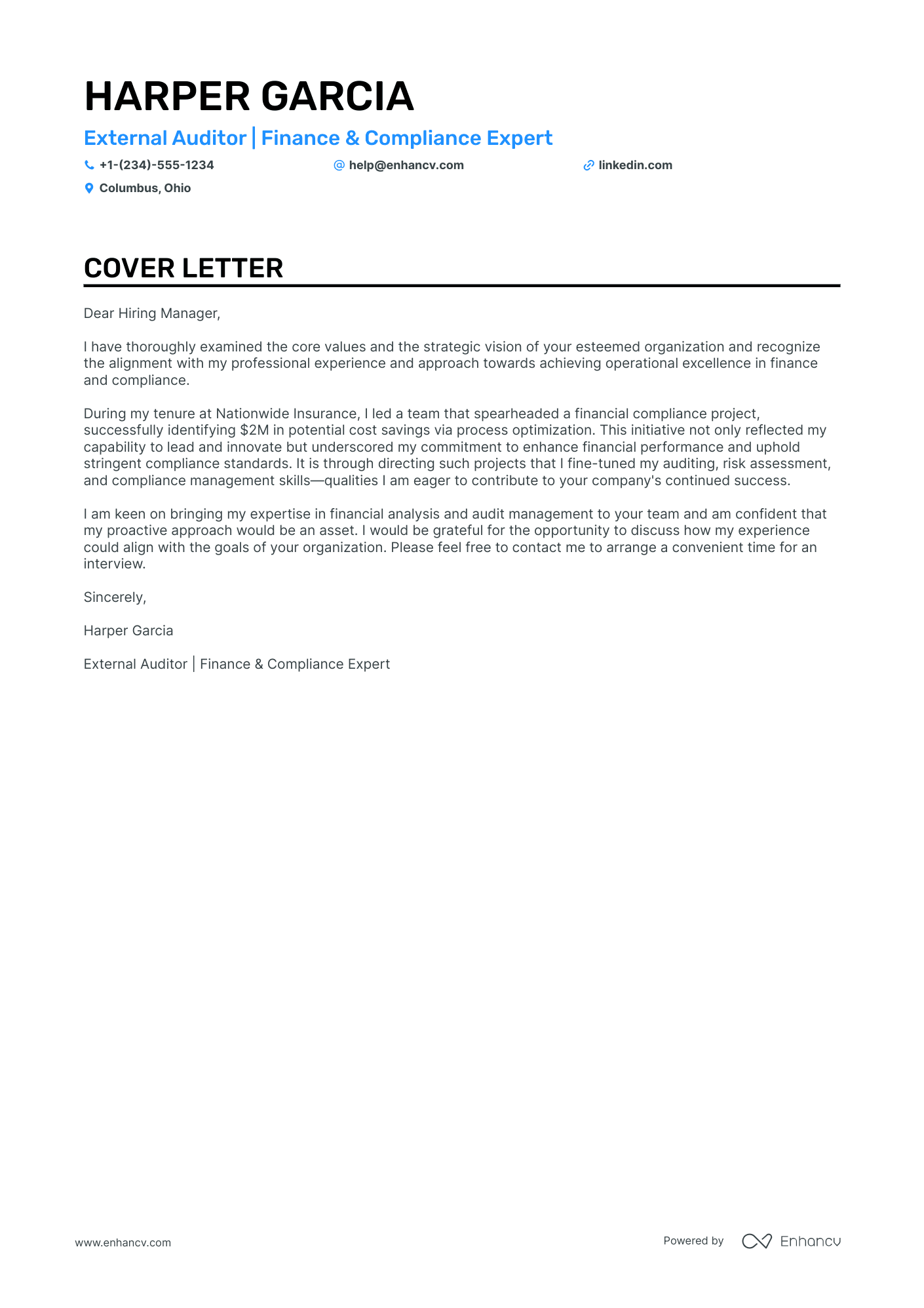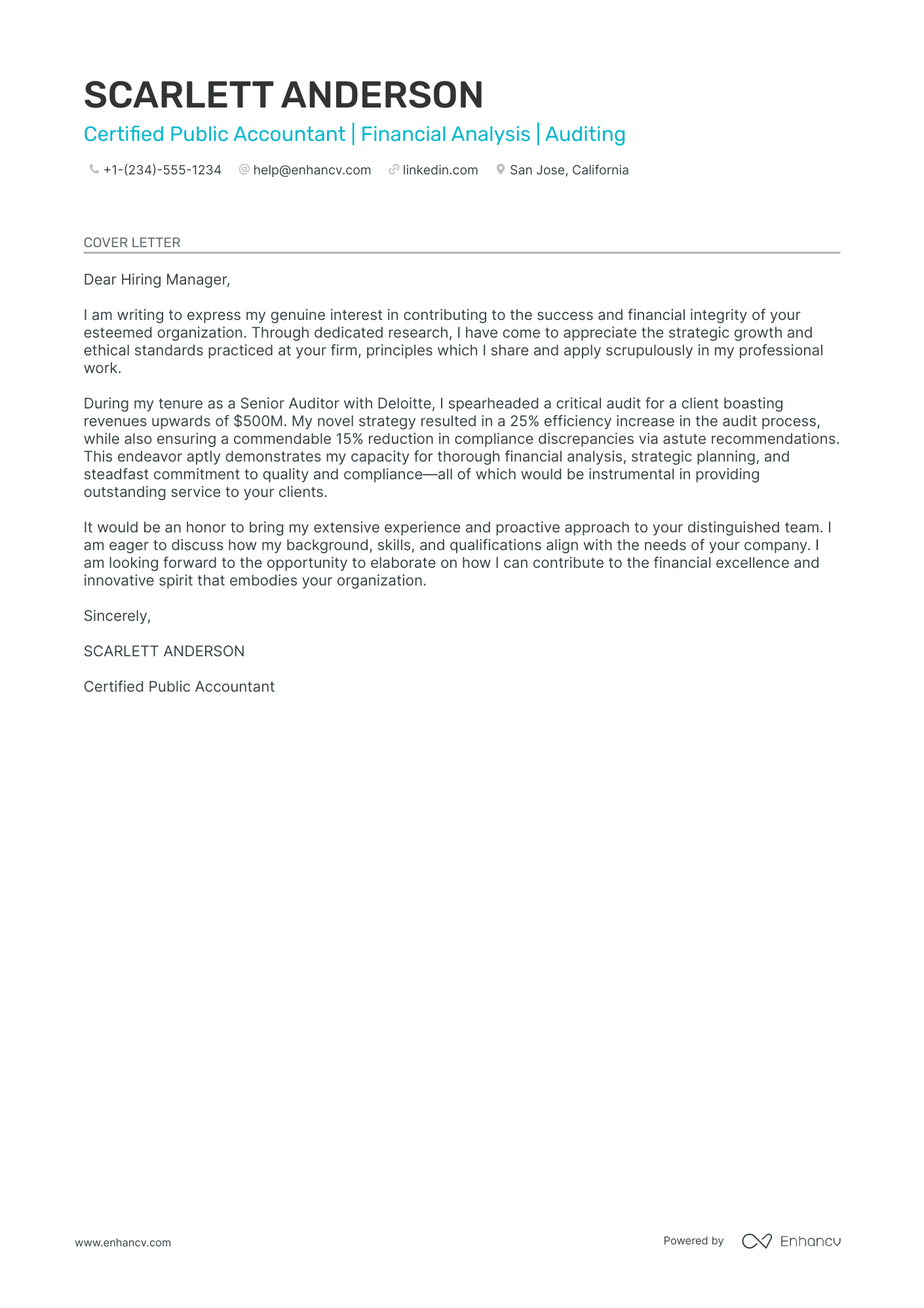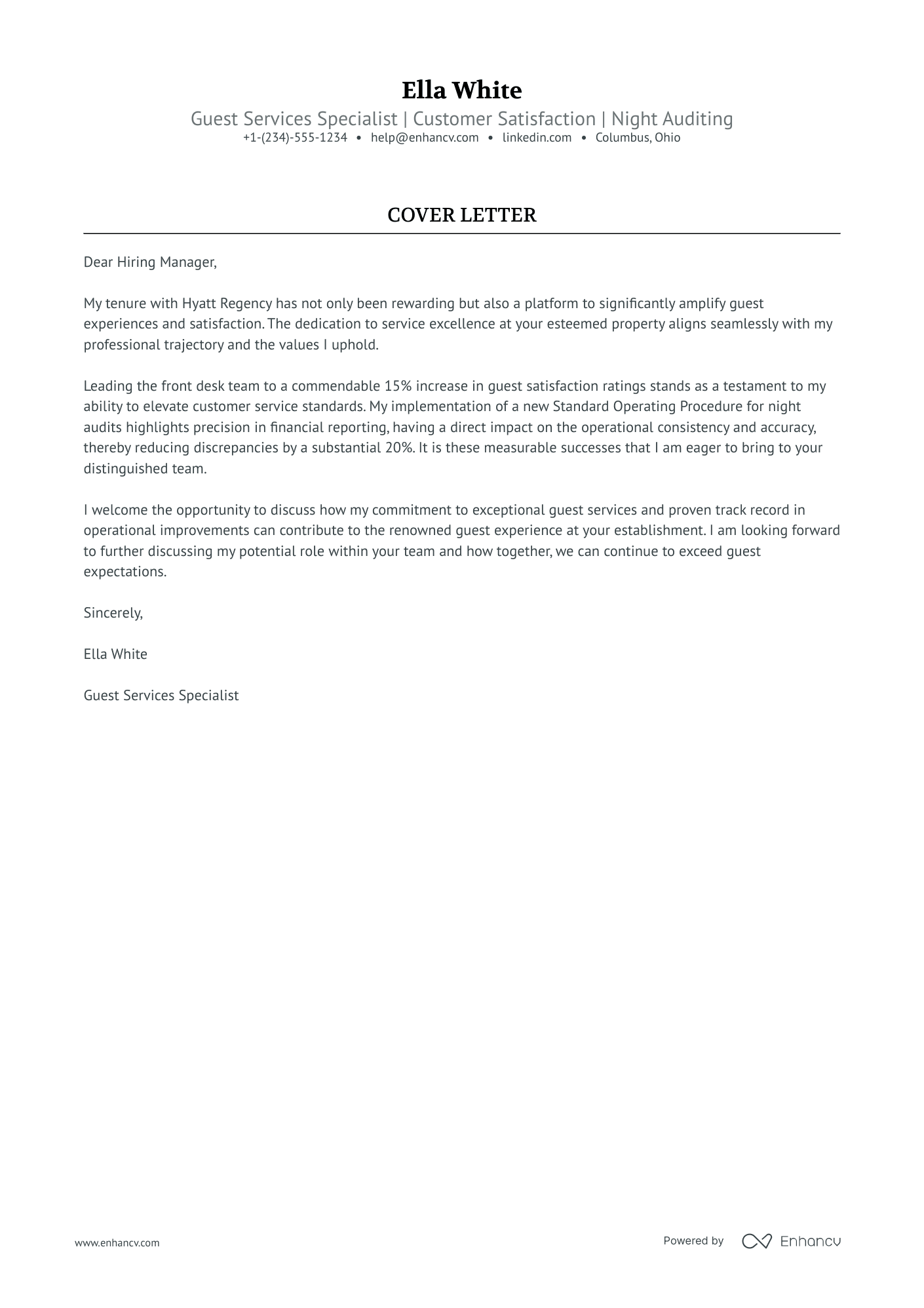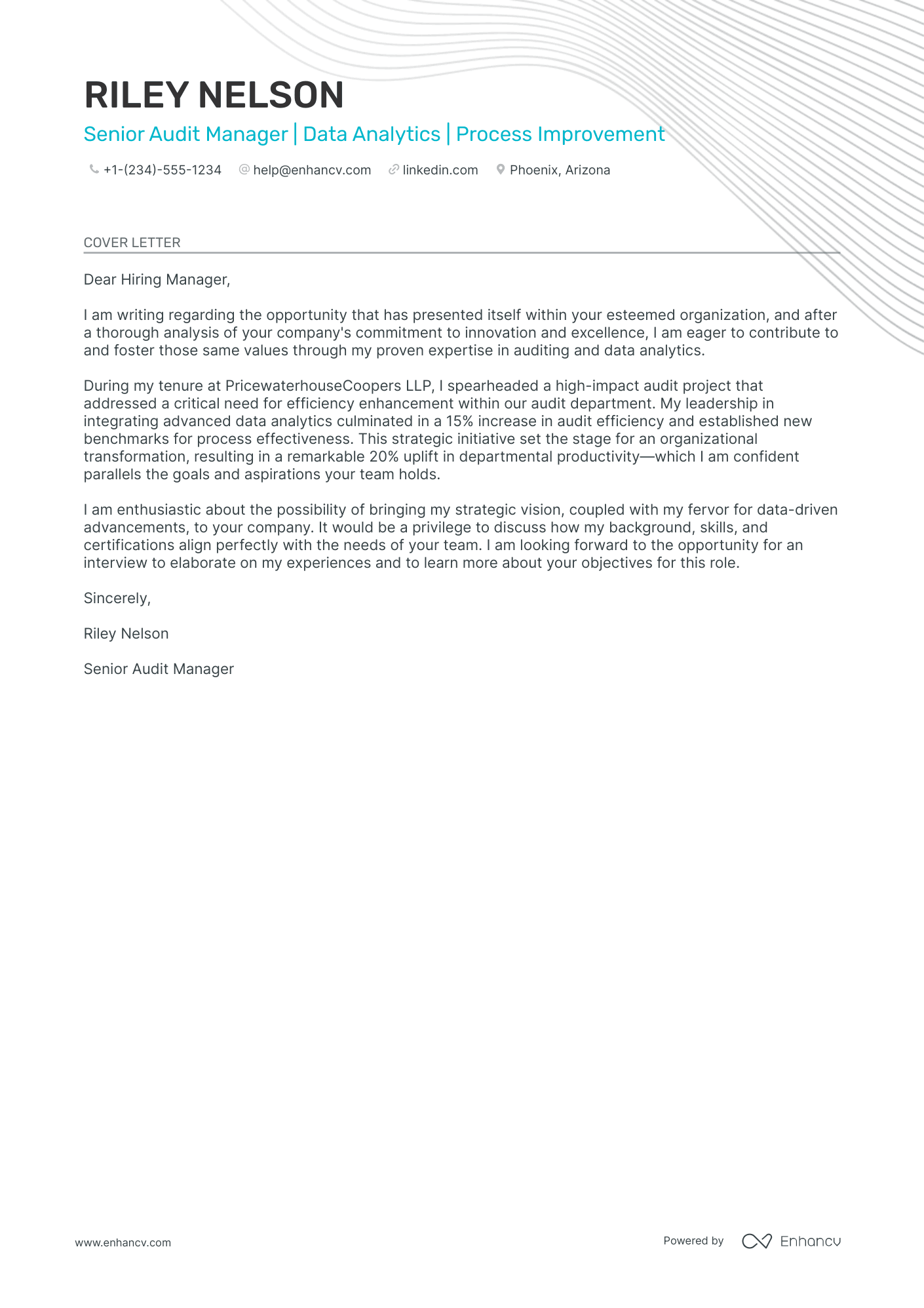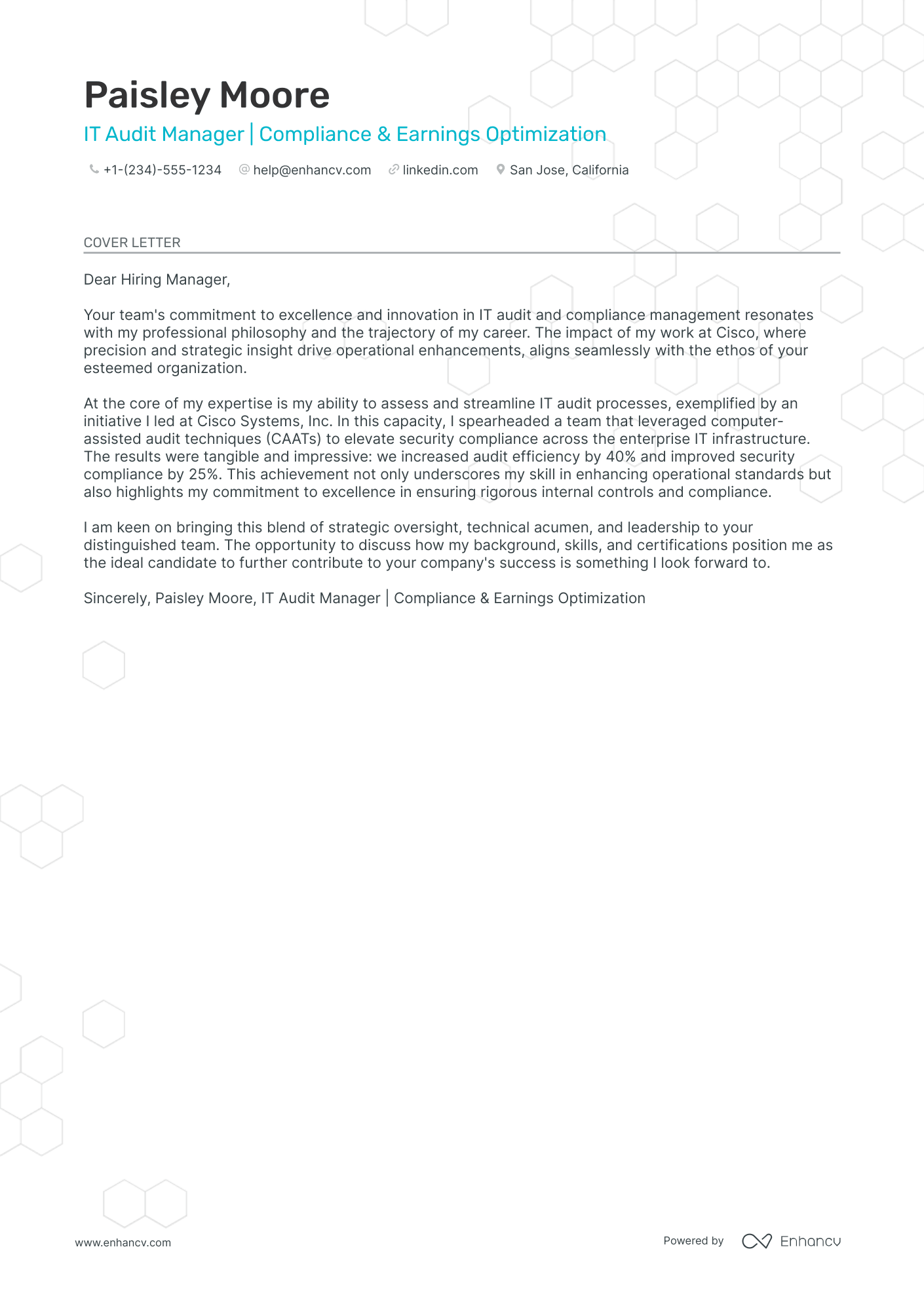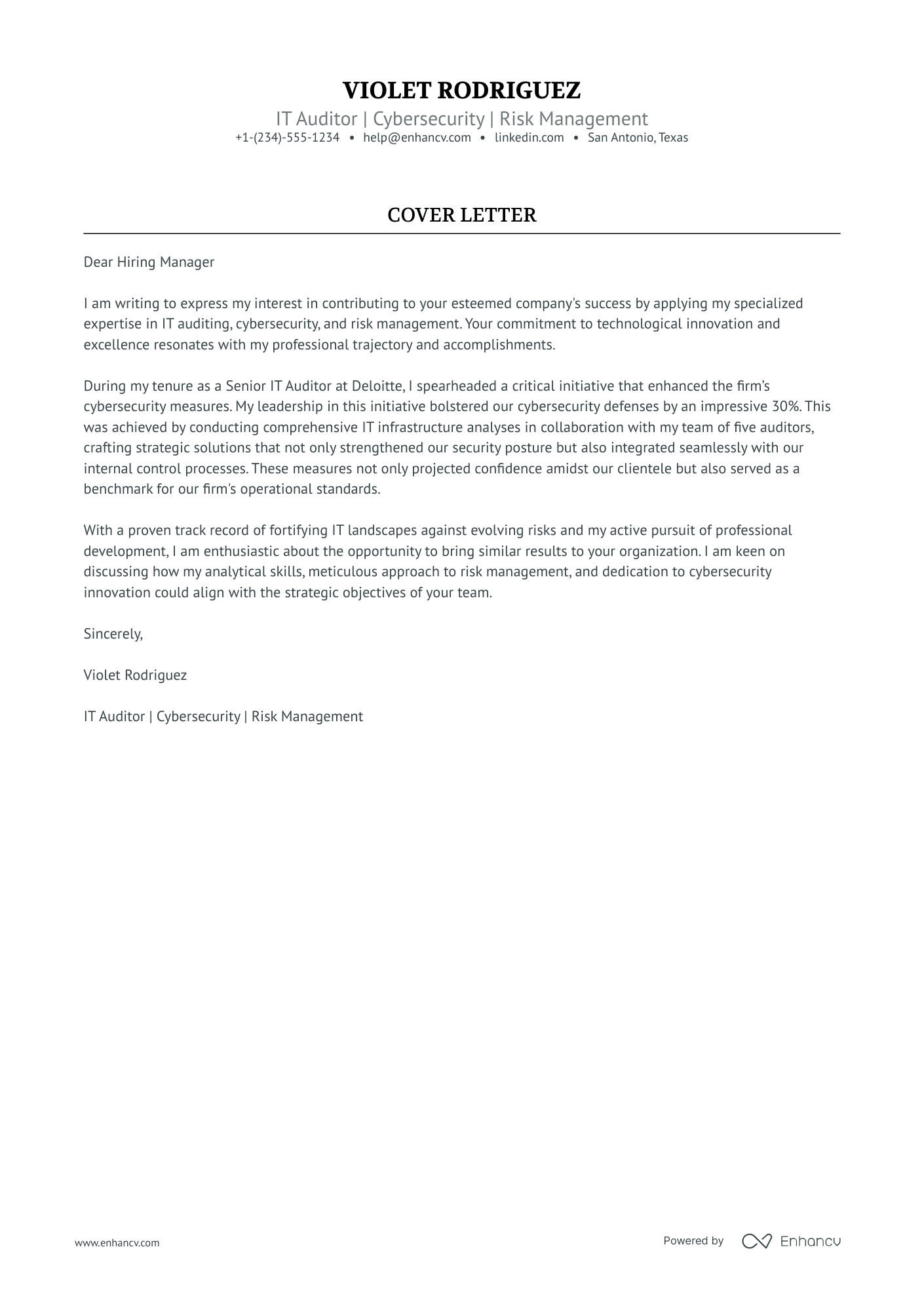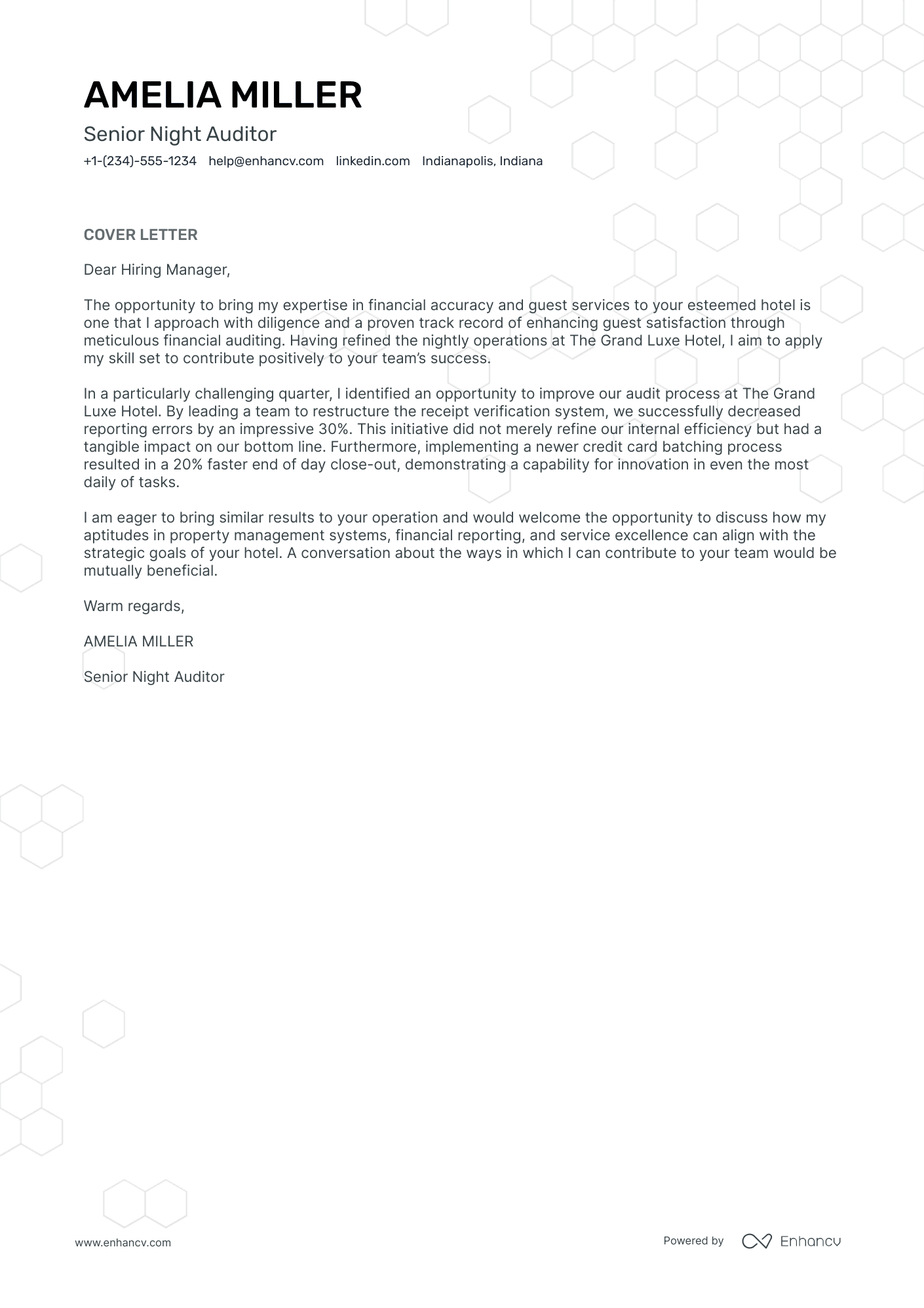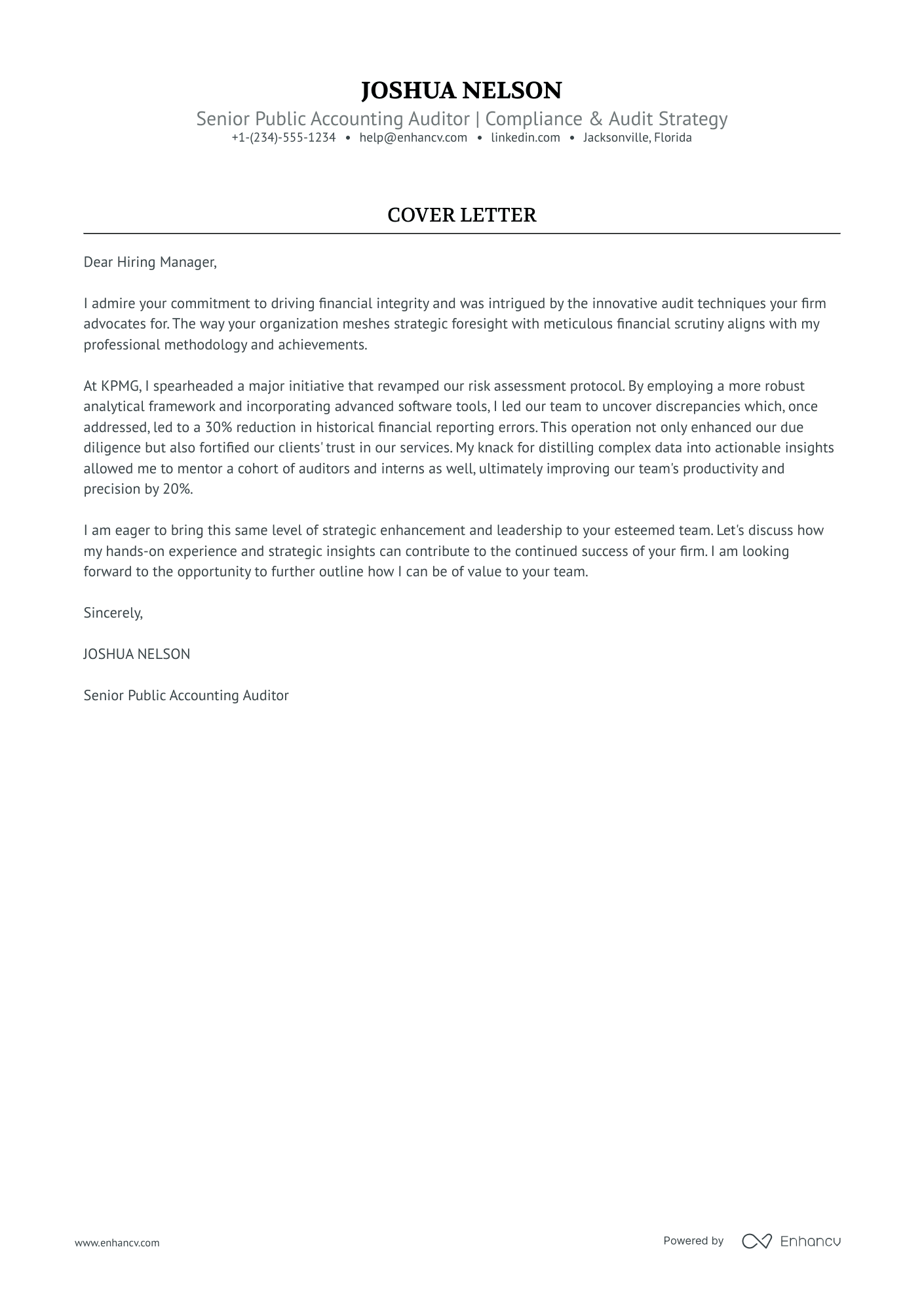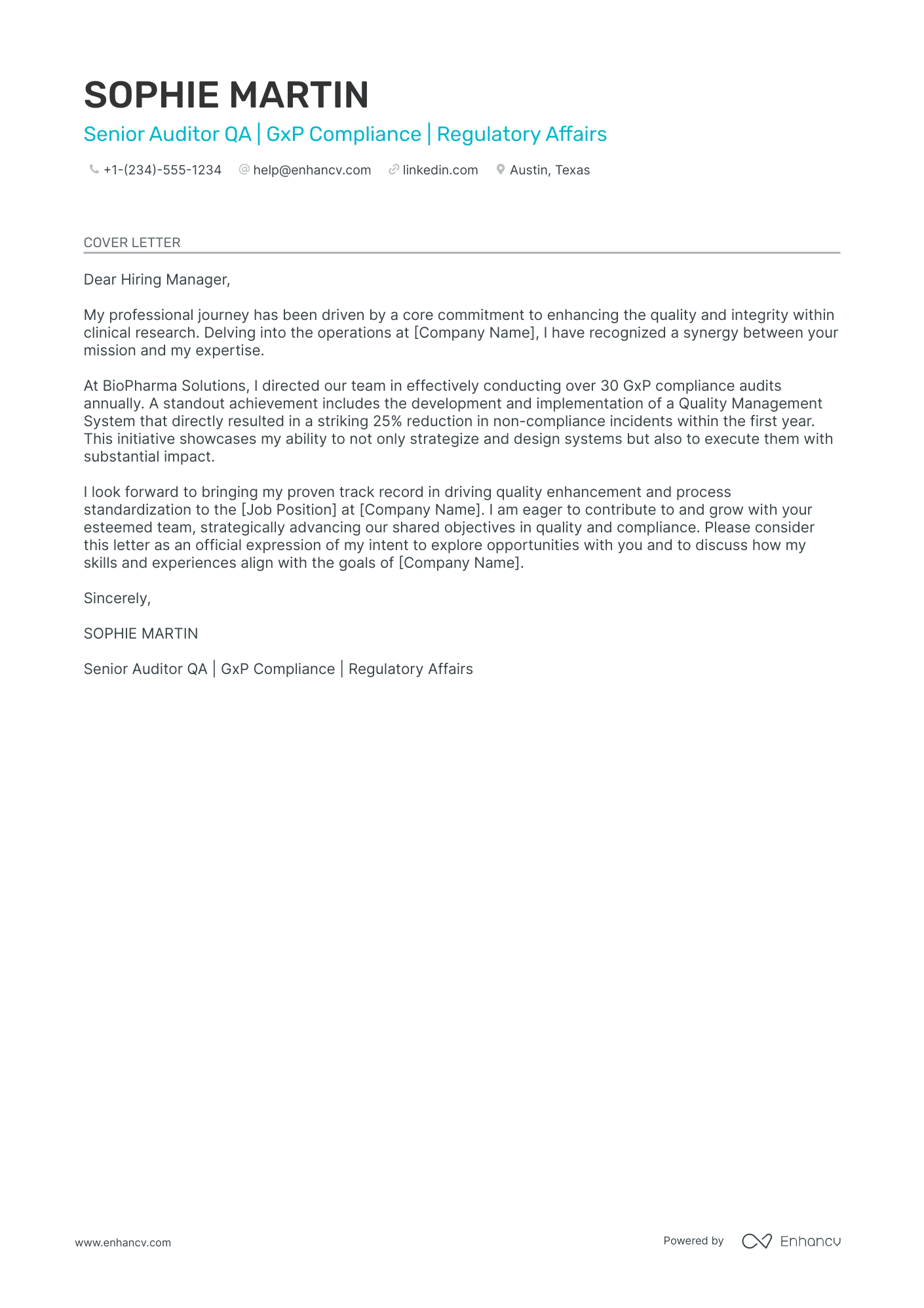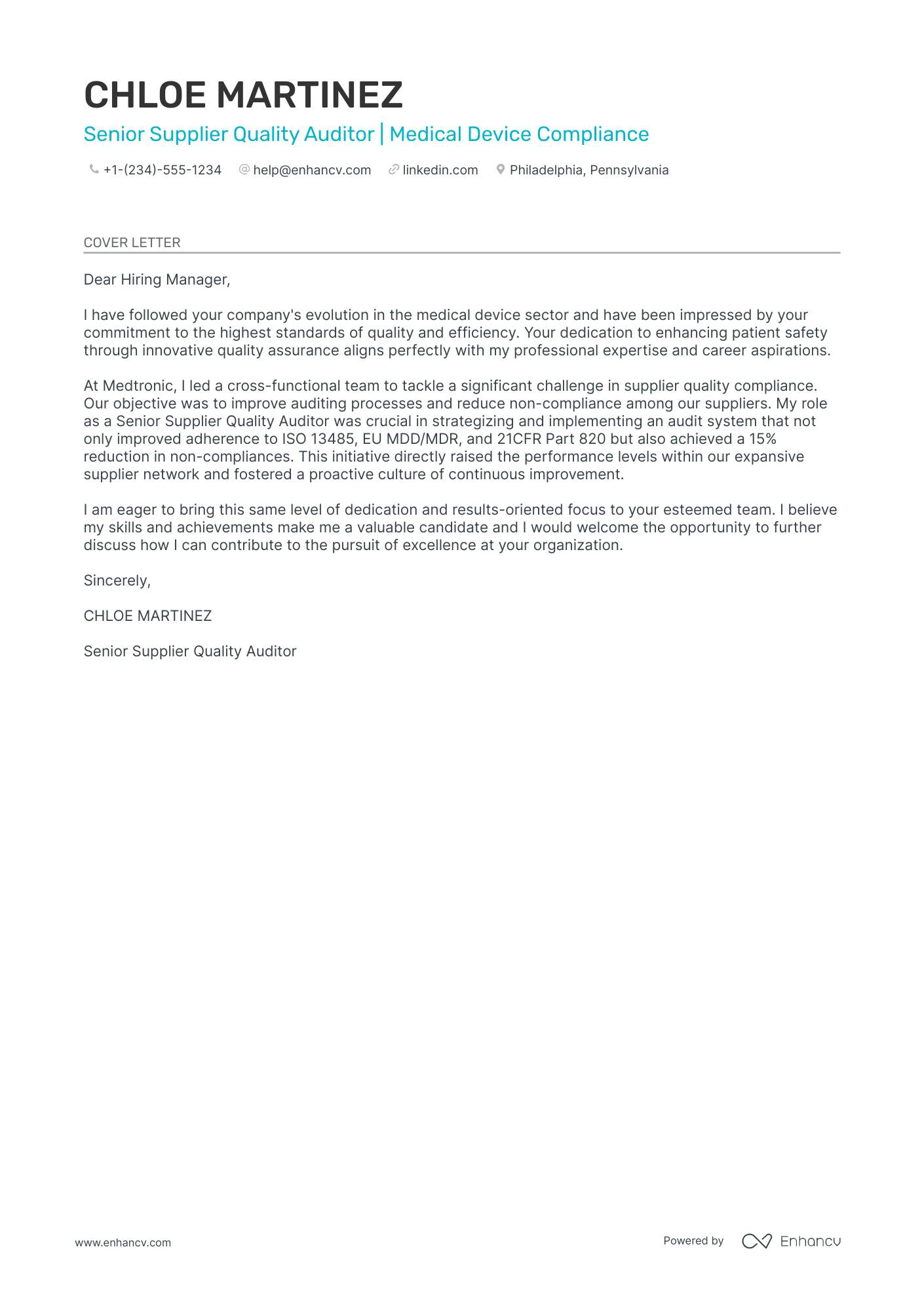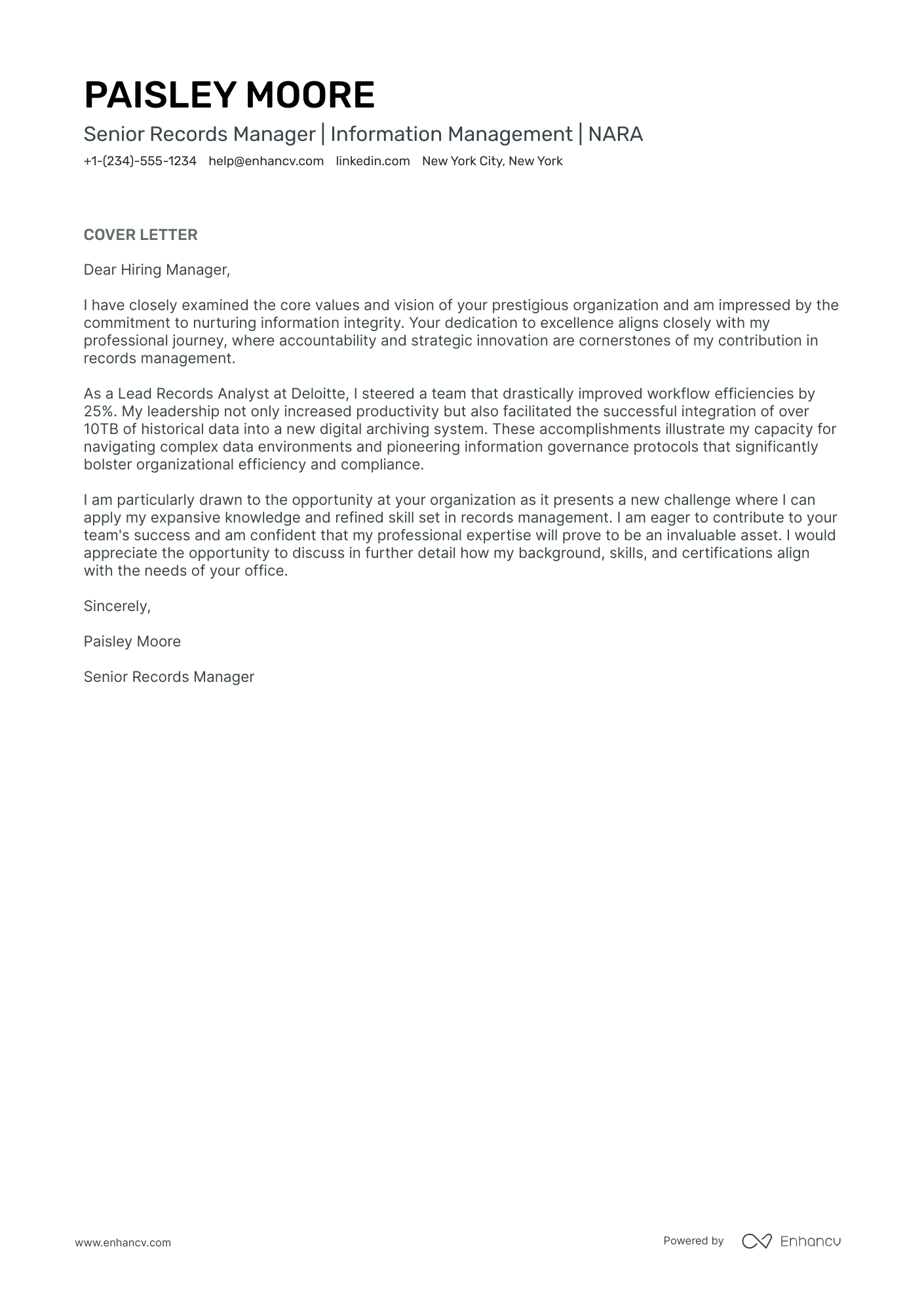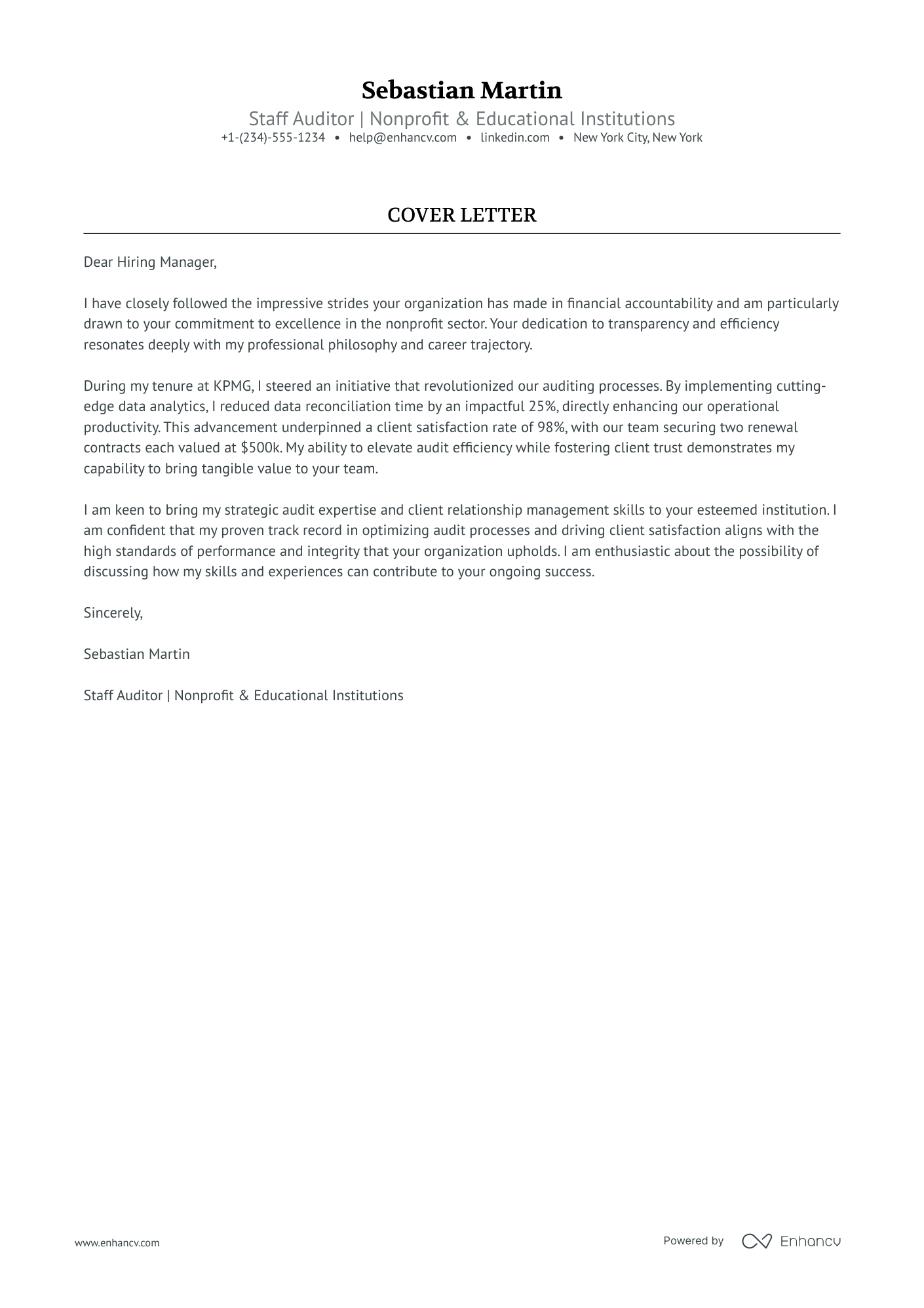Embarking on the job hunt, you’ve likely come across the critical need for a cover letter to complement your resume. Unlike the resume, your auditor cover letter should showcase not just your qualifications but the professional journey behind your proudest achievement. Striking the perfect balance between formality and personalized storytelling can be tricky without rehashing clichés or exceeding the one-page limit. Let’s navigate these common challenges together and create a cover letter that stands out.
- Personalize your auditor cover letter and get inspired by other professionals to tell a compelling story;
- Format and design your auditor cover letter to make an excellent first impression;
- Introduce your best achievement in your auditor cover letter to recruiters;
- How to make sure recruiters get in touch with you, using your auditor cover letter greeting and closing paragraphs.
What is more, did you know that Enhancv's AI can write your cover letter for you? Just upload your auditor resume and get ready to forward your job application in a flash.
If the auditor isn't exactly the one you're looking for we have a plethora of cover letter examples for jobs like this one:
- Auditor resume guide and example
- Director of Accounting cover letter example
- Internal Audit Manager cover letter example
- Banking cover letter example
- Accounting Supervisor cover letter example
- Purchase Manager cover letter example
- Staff Auditor cover letter example
- Collections Specialist cover letter example
- Actuary cover letter example
- Financial Accountant cover letter example
- IT Auditor cover letter example
Auditor cover letter example
JASMINE BELL
Los Angeles, CA
+1-(234)-555-1234
help@enhancv.com
- Professional Experience: The cover letter emphasizes a decade of industry experience and past auditing roles with high-profile companies (Amazon and Microsoft), which immediately establishes credibility and relevance to the role.
- Achievements in Previous Positions: It specifically mentions achievements, such as leading a team and developing innovative auditing methods, which serve to showcase the applicant's leadership skills and capacity for innovation within their field.
- Knowledge of Standards and Regulations: The applicant clearly states their expertise in GAAP (Generally Accepted Accounting Principles), GAAS (Generally Accepted Auditing Standards), and Federal Regulatory Filings, which are critical knowledge areas for an auditor.
- Role-Specific Skills: The cover letter highlights analytical skills and a strategic approach to risk management and compliance, which are directly relevant to the role of an auditor and are likely to be of interest to the hiring manager.
The visual appeal of your auditor cover letter: format, font, and structure
When using our cover letter builder, make sure to include these vital sections:
- Header (with your name, contact details, the role, and date);
- Greeting (that's personalized to the recruiter);
- Introductory paragraph (to capture attention);
- Body paragraph (to tell a story of how you've obtained your job-crucial skills);
- Closing paragraph (ending with a nod to the future ahead);
- Signature (that is not a must).
Our cover letter templates are already set up for you with the best auditor cover letter design with single-spaced paragraphs and a one-inch margin.
As for the font of your auditor cover letter, use the same one as you did in your resume (where modern and simple fonts, like Rubik and Bitter, take precedence over Arial and Times New Roman).
Your auditor cover letter is created with the recruiters in mind - as no Applicant Tracker System looks over this part of your profile.
When sending over your auditor cover letter, download it in PDF. This format allows your information and design to stay intact and to keep the same visual quality.
The top sections on a auditor cover letter
Header: This section includes your contact information, the date, and the employer’s details. It is crucial for providing clear identification and ensuring the recruiter knows whom they are considering for the auditor position.
Greeting: A professional greeting addressing the hiring manager by name shows you've done your research and adds a personal touch, indicating your attention to detail—a key trait for an auditor.
Opening Paragraph: Here, you succinctly state your interest in the auditor role and mention your core qualifications, which should entice the recruiter to read on, as concise communication is pivotal in auditing.
Professional Experience and Skills: This segment is tailored to highlight specific auditing experiences, your familiarity with compliance and risk management, and relevant skills such as data analysis, which demonstrate your capability to perform essential auditor tasks.
Closing Paragraph: In this final section, reiterate your enthusiasm for the position, express your willingness to further discuss how your background aligns with the job requirements, and thank the recruiter for considering your application, ensuring a polite and professional end to your cover letter.
Key qualities recruiters search for in a candidate’s cover letter
- Attention to detail: Ensures accurate audits and the ability to detect inconsistencies or financial discrepancies.
- Analytical skills: Allows auditors to critically assess financial information, recognize patterns, and understand complex data.
- Independence and objectivity: Maintains professional integrity and the ability to provide unbiased conclusions.
- Knowledge of accounting principles and regulatory requirements: Essential for ensuring compliance with current financial reporting standards and laws.
- Communication skills: Enables effective discussion of findings with clients and the preparation of clear audit reports.
- Problem-solving abilities: Allows auditors to identify issues and develop recommendations for improving an organization’s financial management and controls.
What matters most when tailoring your auditor cover letter salutation
Your auditor cover letter greeting should feel welcoming to recruiters.
Use their first name (e.g. "Dear Marshall" or "Dear Sara"), if you've previously been in touch with the hiring manager and are on a more friendly basis.
If this is the first time you're contacting the recruiters, start your auditor cover letter with:
- their last name (e.g. "Dear Ms. Ali" or "Dear Mr. Stevens") - look up who's the hiring manager for the role on social media or the company website;
- generalized greeting (e.g. "Dear HR Team") - just don't use "To whom it may concern" or "Dear Sir/Madam".
List of salutations you can use
- Dear Hiring Manager,
- Dear [Company Name] Team,
- Dear [Department] Department,
- Dear Mr./Ms. [Last Name],
- Dear [Professional Title],
Using your auditor cover letter intro to show your dedication
We know just how difficult it is to start writing your auditor cover letter introduction.
There are so many great qualities you have as a professional, which one should you choose?
How about writing up to two sentences about your passion and commitment to the work you do or are set to do?
Try to describe exactly what you enjoy about the potential role.
A positive attitude from the get-go will help you stand out as a motivated auditor professional.
That one achievement in your auditor cover letter body
The lengthiest part of your auditor cover letter is the body.
Within the next three to six middle paragraphs, present yourself as the best candidate for the role.
How can you do that without retelling your whole professional resume?
Select one key achievement that covers job-crucial skills and technologies (and is memorable).
Within the body of your auditor cover letter, aim to tell the story of how you achieved your success. Also, write about how this would help out your potential team.
Time to wrap up your auditor cover letter
Writing the closing paragraph of your auditor cover letter is just as important as the salutation.
You have to make it personalized to the job advert and recruiter.
Experienced professionals advise candidates to end with a request or reminder for follow-up. Write that you're grateful for the opportunity, and, at the same time, hint that you're available for the next steps of the process.
Otherwise, you could also conclude your auditor cover letter by facing the future. How do you see yourself, as part of the team? In particular, how would you settle in your new role in the first six months to a year?
Which story should you tell in your auditor cover letter when you have zero experience
Candidates, lacking professional experience in the field - this one is for you.
Your auditor cover letter is an exercise of integrity, honesty, and, above all, spinning a positive narrative around your strengths.
And what better way to capture recruiters' attention than with your most job-relevant achievement (this could be from your internship or volunteering experience)?
Make sure to back up your success with transferrable skills that are relevant to the job (e.g. how your year, studying abroad, has taught you to be more motivated and handle multicultural environments).
Another safe card you can bet on is your career dream: in the body of your auditor cover letter, go into the details of how your ambitions would help make the company you're applying for better.
Key takeaways
Within this Enhancv guide, we've provided you with plenty of advice and inspiration on writing your auditor cover letter:
- Always make sure your auditor cover letter is tailored to the role you're applying for to make a good impression on recruiters;
- In your auditor cover letter include a header (with your name, the role you're applying for, date, and contact details) and an introduction of up to two sentences that highlight your key accomplishment or why you'd fit the role;
- Focus your auditor cover letter body on one sole achievement through your career and all the valuable lessons, skills, and know-how you've learned (that are relevant to the role);
- Ensure your auditor cover letter closing statement isn't generic and includes either a call to action or a promise;
- If you lack professional experience, shift recruiters' focus to a relevant achievement (thanks to your academic or versatile experience) or toward your dreams and goals for professional growth.
Auditor cover letter examples
Explore additional auditor cover letter samples and guides and see what works for your level of experience or role.
By Experience
Senior Auditor
By Role
